#era why are you writing more series when you have so many things to study for!
Note
Hi!
I love your art and I am extremely enamored by the beauty of your writing !
That being said, I am an artist as well and I feel like I have been stuck in a creative rut and I don’t know how to get to out ? Do you have an advice on breaking out of the hole and as well do you suggest drawing everyday as a method to keep up with skill?
Thank you so much <3
Thanks so much! I considered this for a while. Giving artistic advice, whether broad or targeted, is always difficult. It's too nebulous of a process for rules but everyone still has such a strong opinion on what the rules should be.
In my experience, lulls are beneficial when seen from the correct perspective and then taken advantage of. Endless production is antithetical to all art that is not corporate in nature, and lack of inspiration means you will benefit from something often overlooked: new experiences and engagement with new things. Though if you do want to feel productive, take a sketchbook and a pen to a public area and draw what you see for an hour or two. You likely won't be inspired but you will feel accomplished.
Historically, artists took extended periods of time away from creating in order to experience life and take in the world, its people, and themselves. Not always willingly; some were torn away and sent to war, fled their homeland, or were imprisoned, enslaved, or institutionalized. And there are those who spent long periods of time bedridden by illness or injury. But whether their experiences were gained by choice, by force, or by nature, their time away from art is what ended up shaping what they made. Drawing in isolation will sharpen a skill, but it's through repeated use of that skill to translate your experiences that your art improves.
An artist's goal is communication first and foremost. This is why drawing daily on its own cannot make anyone a better artist. It will eventually lead toward some sort of technical prowess, but technical prowess with no voice is fairly pointless and very dull. Ideally, the development of voice will precede the development of technical skill and the two become honed in tandem. What you want to say should define what you need to learn. If you are developing an understanding of your own intentions then you are already a step ahead of the artist who is focusing solely on their ability to draw a head from every angle.
It's beneficial to conceptualize art as a series of choices rather than a display of objective prowess. The more experiences you have and the more educated you are, the more sophisticated your choices become. You'll also find that you're able to analyze and appreciate (or criticize) the choices of other artists, increasing the enjoyment of engaging with art as a whole. You'll then be led toward more complex and unique work as you become bored with things that salivate over their own palatability. You may also find that art you've passed over before suddenly begins to speak to you.
Spend time exposing yourself to new art, ideally from large swathes of eras, places, and forms, including art that communicates things uncomfortable, disturbing, or offensive to you. Delve into the history of the artists and works you enjoy (or hate) in order to fully understand what's being said and why. If you currently find yourself interacting solely with contemporary art delivered largely via algorithm or advertisement that elicits feelings of familiarity and comfort, you should recognize that as a limitation. You are certainly free to work within it, but you will stumble into inspiration more quickly through exposure to different ideas.
It's also a good time to interact with others, if possible (even from a distance), and to look into topics completely divorced from art. Enrich yourself in many ways. The world is so vast and full of so much. What can you experience and learn that will make you yearn to communicate again?
Try not to waste years studying aimlessly. Develop an interest, a concept, an idea, an experience, and then work toward communicating it effectively. You will learn as you develop new pieces (because you will put effort and energy into targeted research and study), and those pieces will become more complex in both substance and technique.
Good luck!
31 notes
·
View notes
Note
Thoughts on Endeavor?
i think he's a horrible guy but a great character. he reminds me a lot of my own dad (minus all of the. erm. unforgivable abuse and all. it's mostly vibes and motivations in my dad's case, none of the actual heinous shit) so it's hard for me to genuinely like endeavor, but at the same time i'm drawn to how his character develops. he's like a little case study for me. a little lab rat in the lab of my mind, if you will
pairing bakugou up with endeavor in terms of similar arcs was both a blessing and a curse imo. they both deal with atonement and not necessarily requiring any forgiveness from whom they hurt, and i think the emphasis on such an arc really benefits both characters. they're both introduced as unlikable individuals who have hurt others for seemingly no reason, but we learn through time their reasons for their actions. so that's why it's a blessing — really cool character writing that also aligns with the series' themes of always wanting to get better and to be a proper hero without the arbitrary status that comes with it. both are given ample time to change their worldviews and their interactions with others too
but it's also a curse because though bakugou and endeavor have similar arcs, they are so WILDLY different in scale. i wince every time i see someone compare bakugou's middle school bullying era with endeavor's LITERAL REPEATED AND INCREASINGLY WORSE ABUSE, and even worse, when they use that as justification as to why bakugou can never become a better person. as if bakugou at his silly ages of 5-14 could EVER do something as horrible as endeavor abusing his entire family and emotionally scarring all of them, which includes his eldest son straight up turning to villainy, his only daughter growing up too fast by trying to keep her broken family alive because there isn't a mother in the house anymore, his middle son straight up hating him and his youngest son refusing to use his fire side in order to get back at him. his wife grew increasingly less emotionally stable and burnt her youngest son due to the pain endeavor was causing her, and had to get sent to a mental institute in order to recover. all bakugou did was bully a little too many times for comfort, which is unfortunately rather common for kids and young teens. THEY ARE NOT THE SAME.
the thing is, i genuinely think endeavor is an interesting character and i want to see where horikoshi is going with him. it's obvious that his entire family does not forgive him yet, and they may never will, due to the withstood damage he's done. he may work towards atonement but may never be redeemed and might even face his crimes in the court of law (which i think would be funny over everything. imagine endeavor in a courtroom.)
but i do think a lot of people very easily disregard his characterization and development because of his sincerely awful first impression. it's hard to empathize with an abusive father who has repeatedly hurt not only one family member, but all five of them. and it's pretty common knowledge that we shouldn't give abusers the time of day, because they'll take it and run
which is absolutely true in the real world, but turns murky when you apply it to endeavor who is clearly trying to better himself. and we know that because there's this fun thing called "looking at a character's POV as an omnipotent reader instead of as another character". we aren't rei, shouto, or anyone else who had the misfortune of being endeavor's family. we're able to see his growth completely detached from his self, so the whole "abusers can never become better, they will just keep abusing" argument works far less for us. we can apply it to real abusers, because we're not in their heads. but we are in endeavor's head sometimes. and it makes his interactions with his family, who clearly don't trust him yet, all the more interesting. like this is one of my favorite pages in the manga for a reason

IT'S SO AWKWARD it's so funny there's so much unaddressed family issues that all stem from endeavor being a piece of shit. like the fact that bkdk are there and have no idea what the fuck to even say, because they're outsiders in this family drama. it's a no-brainer that endeavor was a terrible father and all but it still leads to scenes like these, where the reader can indulge in just how uncomfortable he makes his family. it's so silly
i guess what i'm trying to say is that i think endeavor is a character worth existing and analyzing, especially because of his purpose in the narrative and its themes. he sucks, yeah, and i will probably never grow to actually like him as an individual. he will never scrape the top 10s or even 20s or even 30s in my favorite character lists. but i think reducing his character to just "shitty abusive father who everyone should hate by default because he's a shitty abusive father" detracts from the overall worth he provides. you can hate him, but you can also, regardless, enjoy what he brings to the table. at least that's how it's like for me
it does, however, annoy me when some endeavor apologists just. don't recognize that he abused anyone at all. like bruh are you for real. what do you think his arc is even about
43 notes
·
View notes
Note
Do you think you've about exhausted things to talk about with respect to the 3 Kingdoms era?
Not at all.
This got very out of hand but I'm going to leave it as is.
Oh, sure, some subjects have been beaten to death. There's only so much you can say about the particular events that have been told and retold in folktales, opera, novels, and (in the modern age) movies, TV shows, and video games for the last 1800 years. There isn't a lot left to say about the most famous battles and individuals that hasn't been said already.
There's also a lot that is still relatively overlooked, outside of very specific circles. People who didn't get prominent roles in fictionalizations of the period are still pretty obscure. Events that aren't depicted in stories and adaptations don't get much discussion. That's the sort of thing I try to write about, like with my articles on the Crown Prince Affair (Part I | Part II) or my series on Yuan Shao and Gongsun Zan.
But the things I write about are just one very limited facet of the period's history. There's so much more to be said. The stuff I write about is probably the least meaningful. Ultimately it doesn't make much difference who won what battle or what faction took over a government. Individuals varied but all the governments of the time were fundamentally the same. No matter who took power in what region, it was going to be a Han style government, dominated by Han culture. Nothing meaningful was going to change, no matter which of our well-known warlords won. Their battles were largely irrelevant. There's a reason nothing meaningful changed in Shu when it was conquered by Wei, or Wu when conquered by Jin. There's a reason the Sima regime was only superficially different from that of the Cao, and why it really doesn't matter if, say, the Quan family had seized the throne of Wu. Despite individual differences they were all fundamentally the same.
To see what I mean, we don't have to look very far into the future. The collapse of western Jin meant the rise of non-Han polities in significant areas of the former Han/Jin empire. The governments of the Xiongnu, the Xianbei, and and other groups from outside of the Han culture were meaningfully different. Prolonged chaos in the northern portions of the empire resulted in mass movement to the south, into areas previously claimed by the Han people only in name but not in fact. The efforts of Wu and Shu (largely due to He Qi and Ma Zhong) to establish firm control over these regions laid the groundwork for the "sinicization" of southern China, but it was really only with the collapse of Western Jin that the new status quo was established. At the same time, we can also observe the so-called "barbarians" adopting many elements of Han culture to help them rule their new empires.
You could spend your whole career studying something like that.
You could analyze the literature of the period and compare different style and composition across different years and regions. You could dig deep into the economics and study things like government monopolies on key industries, and contrast the different approaches taken by the various rulers of the era. You could study all the material left by civilians who had no part in the "great affairs" of the time. You could study how infrastructure projects meant to support warfare (like the many canals Wei dug) impacted trade and travel for others. You could study the visual arts; paintings, sculptures, miniatures, etc. And all of that gets much more complicated and interesting when you reach beyond the Han culture, into the areas and eras where non-Han influences achieved supremacy and influenced the existing culture.
The era produced some of China's most influential figures whose contributions are far more meaningful than the battles fought by its various generals. Zhong Yao's calligraphy was so influential that we still imitate his writing today. Pei Xiu was one of the most important cartographers in China's extensive history. Hua Tuo's scientific approach to medicine was revolutionary in its time. Du Kui and Xun Xu made extraordinary contributions to music. There are so many others to speak of.
Sociology. Visual arts. Performing arts. Economics. Mathematics. Literature. Technology. The list goes on and on and on. There is absolutely no shortage of new things to study and talk about. A very accessible example is the deep dive @discourseofthethreekingdoms did on the theology of the Yellow Turbans. I don't think I've ever heard that much said about them anywhere. It was a significant and meaningful look at the actual beliefs and ideology of a group usually just dismissed as rebellious malcontents deceived by charismatic opportunists.
Now, none of that is what I generally write about. A big part of that is because that's serious academic work. It's hard, it's complicated, and it requires both resources and training I don't have to get it right. I'm not any kind of real academic. There are people doing this work, and because it doesn't have mass appeal they don't get the kind of credit they deserve, but that's the kind of work that actually matters. People like to read about wars and battles and politics and don't give the same attention to these much more serious and meaningful subjects. It's a damn shame, really, and I can only hope that the ones doing the important work at least receive the respect of their peers.
And if I'm being fully honest, even if I did have the training and resources it takes to do the important work, that's not where my passion is.
I'm a storyteller.
I'm fascinated by these people and their lives. When I get invested in a particular historical era, it's because I find it to be filled with a wide variety of very interesting individuals whose stories I love, and whose stories I want to try to share with others. I like to tell the stories I think don't get told enough; or that get so obscured by fictionalization that the real people involved become unrecognizable. That does end up with me writing about a lot of battles and politicking, because that's where we get a lot of these stories from. When I believe a story is left untold (like with the Crown Prince Affair) I want to tell it. When I believe that a story is being misrepresented, I want to try and correct it. The reason I get so passionate about "history vs. fiction" is because these people were real. Their accomplishments and failures were real. Their triumphs and tragedies were real. Every single name you see was a full human being exactly as complex as you are; and so is every single anonymous soldier and civilian killed in their pointless wars.
Some of these stories have been told and retold so many times that there's nothing interesting left to say. But there are so many others that remain in relative obscurity, and ones where the truth has become obscured over time. That's mostly what I spend my time writing about now.
22 notes
·
View notes
Text
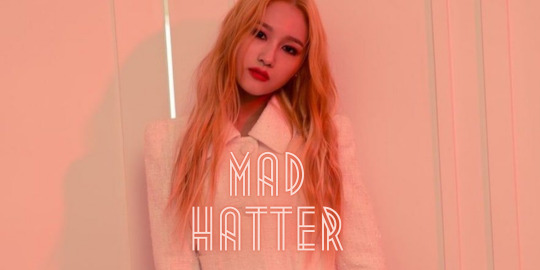
A/N: This is a little early for my North American / South American readers, but I wanted to hit as close as I could to her birthday in KST. This series is coming to a close, and I hope you enjoy this series and enjoy the ending to come!
TW: High levels of magic and intrigue, one of the girls are in their villain era ;), spoilers galore
Summary: You approach the Mad Hatter with many questions, but her answers are less than satisfactory, and your abilities draw you closer to the mysterious Author, as if you might have an idea of who they might be.
♡ Masterlist ♡ 》 》 》 ♧ AU Masterlist ♧
“Strange, isn’t it?”
You stare at the artwork before turning to Siyeon.
“What do you see?”
“A bunny.”
“Really? It just looks like a mess of colors.”
“Sometimes, you have to find beauty in the simplest of things.”
~
A study.
You’re in the Author’s study, and it’s warm and inviting.
“Why are you here again?” She asks before turning around in her chair. “Do you think I’m the villain of this story?’
“Life’s more nuanced than villains and heroes. I mean, you’ve helped me more than the person that I first met.”
“Goodness, you’re so close to figuring it out. You need to think, Alice. Why did Yoohyeon bring you here?” She applies pressure on you before leaning forward on her desk.
She places her hands on the desk and begins to write.
“Is Yoohyeon the villain?”
“No, but you’re naive to think that she wanted to help you.” She off-handedly comments.
“That’s rude to say-”
“Is it?” She glances up at you before shaking her head. “Her dumb mistake would have cost all of us, including yourself. Who has been as honest as they can be? Who has chosen to help you without knowing much about you?”
You’re silent as you’re unable to defend Yoohyeon.
“Why, then, do none of those features apply to Yoohyeon? How can you defend a liar who has the freedom to speak whenever she pleases?” She angrily says before pulling the glasses off of her face.
“Yoohyeon isn’t bound by magic?” You softly ask.
“Yes, and why is that?”
“I don’t know.”
A remorseful look sits on the Author’s face.
“It’s not your fault. I don’t know why I am angry with you when you are the main victim in all of this. You don’t remember your life before this, and who’s fault is that?” She sighs before rubbing her face with her hands.
“Yoohyeon’s?”
“No, it’s mine.”
~
With tenacity, you approach the woman at the tea table. JiU offers you a sympathetic thumbs up before heading back towards the kingdom.
Guess I'm on my own now, with these visions and my wit to rely on.
You sigh as you recall the Author's words.
How can you defend a liar who has the freedom to speak whenever she damn pleases?
The Mad Hatter turns toward you before taking her hat off.
"Do you know why a raven is like a writing desk?"
You smile before shaking your head.
"I wouldn't know."
"Neither do I! 'Tis one of the great mysteries of life." She slides a teacup in front of you. "Care for something to drink?"
"I'm not really in the mood for tea-"
"It's not tea. Give it a taste, Alice." The Mad Hatter encourages, and you shrug before taking a sip.
"It's… delicious! What's in this?"
"That's the fun of it!" She cheerfully says. "The beverage takes on whatever flavor you've been craving at the moment."
"How odd…"
"Everything here is odd! That's the whole point of this place!" She jests before bumping you with her elbow. "Tell me, Alice, why did you come to see me?"
"I want answers."
"To what questions?"
"I-" You pause before answering. "Are we really in Wonderland?"
"You're either in Wonderland, or this is your messed up version of the afterlife."
You bite your lip before nodding.
"Okay, then… who is the Author?"
"A woman like me." The Mad Hatter thoughtfully says before setting her teacup down. "Do you blame her for your predicament?"
"She appears to be blaming herself." You say as you remember the remorseful look of the author.
You observe the jet-black haired woman. She carefully looks you up and down before leaning in.
"What game are we playing now? This is no fun if you don't explain how to play." She complains as you sigh.
"No, it's not like that… Siyeon." You pinpoint her name as a memory flashes by your eyes.
"Will you remember me, darling?"
"Forever and always."
"You know me?"
"We've met before, but I have no time to explain." You place the empty teacup on the table before tilting your head at Siyeon. "I need to find the Author."
"But why? What other answer do you seek?"
Why did Yoohyeon drag me down here?
"What is Yoohyeon going to do now?"
Siyeon thinks for a moment before readjusting her top hat.
"Are you sure you want that answer?"
"I'm as ready as I'll ever be."
#kpop x reader#kpop imagines#kpop scenarios#kpop#girl group imagines#girl group scenarios#girl group x reader#kpop fanfic#girl group#dreamcatcher x reader#kpop icons#kpop gg#girl group au#kpop au#girl group fanfic#dreamcatcher au#kpop drabbles#dreamcatcher imagines#dreamcatcher reactions#dreamcatcher scenarios#dreamcatcher#dreamcatcher siyeon#siyeon imagines#siyeon x reader#siyeon scenarios#siyeon dreamcatcher#siyeon au#fanfic#x reader#kpop x you
19 notes
·
View notes
Text
20 questions for fic writers
ty. for the tag, @hangmanbradshaw! between you and mo, i feel v welcomed to tumblr haha
1. How many works do you have on AO3? 7
2. What’s your total AO3 word count? 75,042 (writing this after seeing yours was humbling)
3. What fandoms do you write for? top gun with a sprinkle of marauders-era in my drafts but shhh
4. What are your top 5 fics by kudos?
there's a limit to your love -- sereshaw amnesia fic
caught a fever from the inside -- bradley fixing all of jake's self doubt and thought spiraling issues with his wang
sugar on my tongue -- pierced nip fic no. 1
when bradley falls in love (goose&carole's version) -- iwtby companion piece for someone's birthday
you've got the win in your bag -- pierced nip fic no. 2
5. Do you respond to comments? Why or why not? yes! from the point that i started doing it (i don't have the attention span to go back, sorry) but moving forward i do! i eat every comment i get as crunch croutons on my soup
6. What is the fic you wrote with the angstiest ending? LOL can i answer with some ideas on my "to write" list here because...
7. What’s the fic you wrote with the happiest ending? fever's got a pretty happy ending for how spiral-y it starts off with
8. Do you get hate on fics? nah
9. Do you write smut? If so, what kind? stares at the 20k series i wrote about jake seresin with nipple ring(s)
10. Do you write crossovers? What’s the craziest one you’ve written? technically i wrote an in-fandom crossover in the iwtby-verse! but nothing so far
11. Have you ever had a fic stolen? doubt it!
12. Have you ever had a fic translated? nope!
13. Have you ever co-written a fic before? i did a round robin fic that was pretty fun, but otherwise no(t yet). i vibe with group writing though, wouldn't be opposed to doing it more!
14. What’s your all time favorite ship? jake/bradley right now! took a fandom break for a long while, but was definitely a deancas girl for a while, also i have read a large chunk of "the man from uncle" illya kuryakin/napoleon solo fic, i'm not sorry.
15. What’s a WIP you want to finish but doubt you ever will? ahhh there's a few i am afraid i have preemptively lost steam before even starting but i am not giving up (yet)! there's a reverse-hanahaki-disease jake/bradley that got riffed on discord that i really want to write.
16. What are your writing strengths? idk maybe thought spiraling and angst?
17. What are your writing weaknesses? keeping things short/to the point hahaha
18. Thoughts on writing dialogue in another language in fic? fine with it, but i do judge the google translate options from french when i read it (sorry)
19. First fandom you wrote for? probably supernatural or harry potter, i can't remember
20. Favorite fic you’ve written? fever is definitely my fav, both 'cause it's the first thing i wrote in a long time and kinda dragged me back into fandom, and because i love me some self-deprecating introspective character studies. limits might take this place when i finish it!
i tag @magdarko in response :) and @lewispullsman also for all your tumblr pro tips! (no pressure)
4 notes
·
View notes
Text
Headcanon: The Thorne Family - Origins | Family | France
For Day 4, I've decided to go in slight HC territory on what I believe Kiara's family and background is like. Some of these influences will eventually factor in how I will eventually write her in Petals and Thornes. I'm still trying to figure a lot of things out, so much of this is subject to change. At the end, I'll probably also throw in a bit about my HCs for Kiki's visits to France.
Lineage - TCATF & TRM era
• As many people have imagined and canon itself have confirmed, the Therons are descendants of the Thorn warrior clan, famed for their archery skills and the incredible Heart Oak wood that is as durable and strong as metal.
• As magic itself fades from the Cordonian landscape, the same trees lose this specific quality, but their durability remains, ensuring that their high-end furniture becomes one of Castelserraillan's most valuable export (credit to @mand-delemonde for this hc!!)
• So in my HC Rowan "betrays" Kenna (tho is it really a betrayal when Rowan was upfront all day every day about how much she loathed tyrant!Kenna) but also outwits her, steals a boat and escapes never to be seen by Kenna again. This is primarily because Leon and Kenna made some extraordinarily bad judgements regarding Thorngate before the Battle of the Bay, which led Rowan to correctly deduce that Kenna allowed her success with regaining Stormholt to get to her head, and pretty much tried to lord over the people of Bellemere and suck out their resources for her battles. A lot of Stormholt historians wrote this from Kenna and later Zenobia's perspective, but over a period of time more historians accepted the view that what Stormholt wanted out of Bellemere would have set the latter back by at least a century. (Credit to @cassiopeiacorvus and @thecapturedafrique for this one!)
• This is primarily why Castel is initially a kingdom and not entirely part of Cordonia, and therefore no descendants of Thorngate feature in any of the texts on Cordonia's Renaissance era. (This has given a lot of Cordonian historians pause before, considering that modern day Castel's culture is literally a love letter to that era!)
• However there is one connection that eventually results in the place integrating with Cordonia and becoming a prime duchy. Both Artemisia Fierro* and Sofonisba Vescovi* who were once from prominent noble families, willingly have their houses fade into obscurity once King Fabien is crowned and Lisabetta (MC) becomes his Queen. The two travel incognito to this kingdom, become scholars and write a series of books. A descendant of Sofonisba's marries into the family and at least 70 years later, Castel officially becomes part of Cordonia.
• The two scholars kept in close touch with King Fabien, even though their hideout was to a place that Cordonians deemed hostile. To ensure his friends stayed safe, he made sure there was no enmity between his throne and them, which resulted in the people of Castel perhaps having more regard for him than any other ruler of Cordonia, even today.
• Castelserraillan ironically becomes THE place if you want to get a comprehensive and accurate study of the Renaissance in Cordonia.
Present Day
• Duke Hakim Thorne is the son of Beatrice Thorne - the former Duchess - and Mehdi Hakmoun, a Gnawa musician from Fes in Morocco. It was love at first sight for both of them, and Beatrice fought much familial opposition to marry Mehdi. He became well loved in Castel and in fact music became a far more respected art form when he became Duke through Beatrice. They welcomed their firstborn Hakim, and his sister Hala a few years later.
• Hala moved to Marrakesh - where some of the family had resettled - at some point, being very fond of her father's side of the family. She often visits Castel and all the cousins keep in close touch. It is for them that Kiara hosts a henna ceremony before her wedding.
• Castel already had French influences before Hakim's marriage to Joëlle, and influences from the Maghreb before his mother Beatrice's wedding to Mehdi, but these marriages further cemented the love for those languages (French and Arabic).
• Castel is known for several things - the hub for LGBTQ communities, the literature and art capital of Cordonia, their incredible warm weather variety wines, just to name a few.
France Headcanons
• Joëlle Moreau was born and brought up in Orlèans near the Loire, in north-central France. She has an older sister named Jeanette, named partially for Joan d'Arc whose courage and martyrdom put Loire on the world map. Jeanette has her eldest daughter Celèste and twins Céline and Cédric.
• It is unfortunately Cédric's wedding that Kiara had to skip, because she needed to attend King Liam and Lady Esther's wedding at the same time. But the family knew it was a national event that she couldn't avoid, and were especially proud of her bravery at the boutique when the news was reported.
• Celeste and Kiara have always been very close, and still keep in touch regularly. Kiara is godmother to her second child Hélène.
• The cousins love cycling and Kiara makes it a point to come down to France in July for the Tour de France.
• Kiara's favourite poet is Guillaume Appollinaire
• When visiting Loire, Kiara and Joëlle's favourite chateau to visit is Le château royal d’Amboise and Clos-Lucé which houses Leonardo Da Vinci's tomb and where he stayed for a while.
• Kiara loves Pinot Noir and goat cheeses, both of which are in plenty in Centre-Loire
• While in Paris, Kiara loves to wear mostly black. She knows how to snazz it up with chic accessories
• Whenever she can, she tries to make the two hr drive from Paris to Orlèans when she visits France.
--
*Artemisia Fierro is the name for my Hunter in TRM. My playthrough has the f!Asian Hunter. She was named for the artist Artemesia Gentileschi.
* Sofonisba Vescovi is the name for my Kayden in TRM. My playthrough has the f!Black Kayden. She was named for the artist Sofonisba Anguissola.
#kiara theron#kiaratheronappreciationweek#KTAW#the royal romance#the royal heir#the royal finale#KTAW Day 4#KTAW Day 4: Origins#KTAW Day 4: France#lizzybeth1986#content: headcanon
12 notes
·
View notes
Text
The Beat Has Just Begun: chapter 1 extras
I love to do informal research and I love to talk about it, so I'm going to be doing one post per chapter to keep me from filling the chapter end notes with extraneous information. Mild spoilers for chapter 1 below.
I spent more time than most people would consider necessary doing research for this story. I searched for Indiana radio stations, I searched for magazine covers, and in some cases I dug up real magazine articles. It's not like this is in any way necessary, but I find having real-world "props" in my head as I'm writing to be helpful, so here we are. I mean, I looked up a lot of things. I have tons of pictures of late 70's and early 80's bathrooms saved to my hard drive. I have a mid-80's photo of a McDonalds menu I found on Reddit. I paged through a ton of books on archive.org. When I got serious about writing this story (and fic for this fandom in general) I rewatched the entire series and took detailed notes in a googledoc that ended up spanning 163 pages. So, you know, all of that research has to go somewhere. Why not tumblr?
Let's start with WTPI: a real radio station in Indianapolis which went on the air in August 1984. I even found a logo here. If they were giving away buttons it's not hard to imagine they might have made t-shirts, too.
Below are the magazines Steve found in his dad's study, apart from the Harvard Business Review which did not have cover photos at the time (but you can access the articles here).



And here are the magazines Steve bought for Eddie at the Fair Mart.
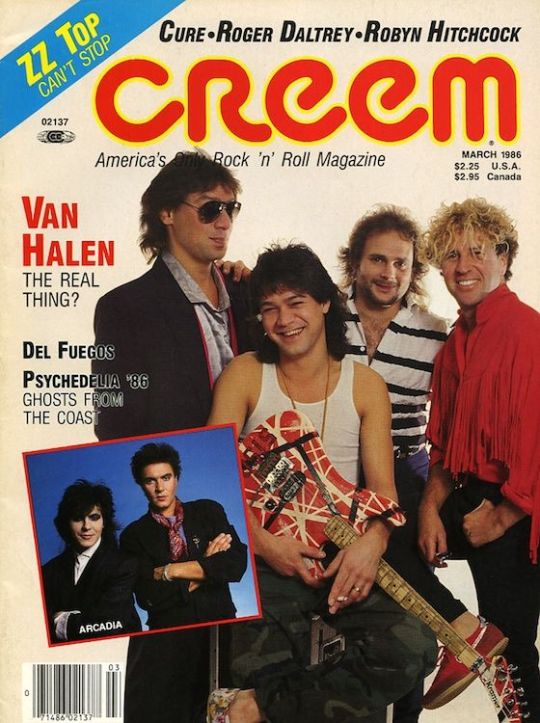

Further to this, the Creem archives are available online, and this issue in particular can be found here.
Did you know Popular Mechanics is available to read on the Internet Archive? Here's the issue I decided Steve had in his room.
I also want to point out (because I don't think I've seen this come up in fic before) that Eddie actually has a lot of tattoos for the era. You look up photos or music videos from back then featuring the most popular metal musicians (here's one, for example), and you see a bunch of very skinny long-haired white dudes in white sneakers or high-heeled boots (at the time combat boots were more associated with punk than metal) who generally have like one tattoo at best. Even the members of Mötley Crüe didn't have all that many yet (see for example the Home Sweet Home video from 1985). Having a tattoo at all, any kind of tattoo, was considered incredibly subversive, and that didn't really start changing until the mid-to-late 90's.
Some general notes on canon divergence:
I decided pretty early on to kill Vecna and in doing so avert the mini-apocalypse in Hawkins, for no other reason than I don't find Vecna interesting as a villain and didn't feel like dealing with multiple gaping portals into a hell-dimension.
I chose to tweak the confrontation between the Creel house team and the jocks - you might notice Erica says she narrowly avoided being tackled by Andy - because I hated that scene, quite frankly. I couldn't figure out a way to get Lucas away from Jason, but I could at least keep Erica from getting tackled by a full-grown man :|
Lastly: Eddie's battle jacket (aka the vest). I didn't realize Steve presumably left it at The War Zone - he wore it in, and when they left he wasn't wearing it anymore - until the abovementioned note-taking rewatch and I was uhhhhh not impressed. A battle jacket means something! It's personal! So, you know, through the magic of fan fiction I fixed it.
1 note
·
View note
Note
With Digimon Ghost Game starting, I thought about how different it is from previous Digimon series, though it's still undoubtedly Digimon... and then I realized all Digimon series are like that. So I wonder, what do you think sets each Digimon series apart from the rest?
I think both Ghost Game but also the reboot have been a wake-up call for people in terms of realizing that likes, dislikes, and tastes are subjective, and I think it's especially important in terms of this fanbase that is so obsessed with this idea you can objectively rank things by quality -- especially when each series is often deliberately trying to have its own identity, so it's arguably apples and oranges -- and forcing this idea of what's Good and Not Good on everyone else (especially when there's a nasty double standard phenomenon where Adventure and often Tamers get to be so impervious to criticism that people conveniently forget they're perfectly capable of being scrutinized for a lot of things they're weaker in). Very frustrating to see everyone who likes less popular series treated as if they have to accept that they like a "badly written series" for some things and everything else is a guilty pleasure, which I find to be incredibly dumb.
The most important take-home here is that the fact each series has its own identity is always going to be the main factor in what makes it "good" or not to you, not some arbitrary bar of comparison that's based on some narrow-minded view of "good writing" (which is usually unreasonably based on Adventure). For instance, the reason why 02 is so important to me is because (see below), to me, it has the highest amount of meaningful, important life lessons and themes that it wanted its audience to remember, to the point that I frankly do not care about where the plot goes in comparison. That may not be the case for everyone else, and that's fine, but should my tastes be called unreasonable for that? I think we're also coming to realize that because of Adventure (and kind of 02)'s precedent, so many people have been judging series purely by how intimate their individual character development style is, but this is unfair because Adventure and 02's ridiculous level of character depth to psychological detail is extremely unusual and unrealistic to expect of others; Adventure and 02 only achieved this by practically considering the plot utterly subservient to its character arcs, and it's arguably why they have some of the weakest "plots" in this franchise. It's so bizarre that I can see character development in other Digimon series that outstrips even most kids' anime on the market, but it's not as much as Adventure's so apparently it's bad. And, moreover, as it turns out, some people have priorities other than characterization; just because Adventure had that as its strength doesn't mean that's the only thing anyone should care about. Is the plot fun? Is there a meaningful message besides characters (also important to me)? Do you vibe with the tone being dark, or being silly? How much do you care about resourceful usage of Digimon lore? That kind of thing. Everyone is different, so that's why everyone has their own priorities. If you’re someone who prefers darker content, you may not realize that writing good and well-timed comedy is actually a very, very difficult task, especially when said comedy simultaneously has meaning (in comparison, it’s surprisingly easy to write “dark” but shallow content).
I think it's fair to like every Digimon series for its own thing, depending on your personal tastes. I can't speak for everyone, but my impressions are that it has to do with the following:
Adventure: Significantly easier to understand than 02 due to its more straightforward plot, and focus on individual character development ("individualism" being a strong point here). In terms of characters, it goes a lot into some very real social problems (the divorce around the Ishida and Takaishi families and the pressures surrounding Jou, for instance) in a very realistic manner. Also, it has that sense of mystique and absurdism to the Digital World that's both whimsical but also mysterious, and while 02 has it too, Adventure's the isekai story that has it the most.
02: The first is its focus on the importance of human relationships and the compelling group dynamic unparalleled in this franchise, and the second is its important themes and life lessons that I think are some of the strongest in said franchise. I have a whole tag for the ridiculous amount of nuance packed into every detail and dialogue line for this series, and I think every time I've rewatched an episode I've learned something new about it because there are so many things that clearly wanted to be said in each line. The entire series is basically an unpacking of the feelings of insidious self-hatred and the crushing feeling of being subject to society's expectations, and ones that are so deep-seated that you often don’t even have a single answer to how to unpack it (for instance, Miyako hardly has a tragic single event in her backstory, but she says and does a lot of things that'll be painfully familiar to those who have experienced chronic anxiety). Almost every plot point can be said to connect to each character arc in some way, and the mantras for appreciating and treasuring your own life and living life the way you will make this, in my opinion, the strongest series in terms of speaking to those who struggle with this kind of existential crisis for reasons of depression or otherwise. (Oops, I think I went too passionate about this; my biases are obvious...)
Tamers: I think it forms an interesting study and unpacking of the kinds of things you take for granted in Digimon or the monster-collecting genre in general, and an examination of how they'd work in a real-world context (although 02 had a focus on daily life, it didn't quite merge the Digimon and the real world factors until very late in the series). Also, probably the second highest on "hard sci-fi" (the only one that outstrips it is probably Appmon, but Appmon has a very different, more simplified take on it).
Frontier: A series that lies somewhere between Adventure's scale of individualism and 02's scale of group dynamic, and one more discussing the feeling of having your heart hardened from being an outcast, and what it takes to accept the idea of opening yourself up to others again. Recommended for those who like transforming hero and magical girl stories, too. From the Digimon perspective, also the one with the most detailed and consistent Digital World mythos.
Savers: I think this is the series that most drives home "life is complicated" (i.e. there isn't a single mastermind behind everything) in the most tasteful manner, because while it drives home the point that you can't just simplify everything into a good side and a bad side, some bad things really are evil (hi, Kurata), and it doesn't change the fact that everyone's responsible for cleaning up the fallout. The portrayal of the evils of government bureaucracy is probably the most realistic out of any of these series.
Xros Wars: For those who like fun, most of all! For those who like seeing Digimon finally get more of the spotlight and individuality since so much of it had been geared and biased towards the humans prior to this. For those who really like worldbuilding, and, after all, this is called Xros Wars, so it's interesting to see shakeups on the usual formulas in the form of the different factions and their priorities. Hunters is very different in tone, but I do think they have some of these aspects in common; that said, it being closer to having single partnerships brings it a bit closer in line to conventional Digimon partnerships, and it also has more of a picture of daily life. Also, as much as Tagiru is probably your-mileage-may-vary since he's not exactly a very nice kid (I get it if you don't vibe with that), which may also rub those hoping for not nice kids to become nice the wrong way, I do have to say I find him to be one of the funniest characters in this entire franchise, and you'd be surprised how hard good comedy is to write.
Appmon: Probably one of the strongest theme narratives besides 02, since it has a very clear and obvious theme about the importance of kindness in a world where technology is dominating and we're almost encouraged to strip the feelings out of everything. (Bonus for more straightforward plot than Adventure or 02 while still retaining a lot of its elements in terms of how to characterize them.) Also the first series to be speculative about the near future instead of taking place around the time it airs, and it's very obvious it wants to provide important and necessary commentary about what we need to do in the incoming era, especially as a lot of what it has to say becomes increasingly relevant.
Reboot: For those who like Digimon mythos and null canon -- this is probably the only series to show it off in this level of detail -- and the kind of cool action fights that would usually be saved for the climax in prior series (and animated in much more intimate detail with battle choreography than prior series would have). There are a lot of people into this franchise who felt like it genuinely was not making enough use of its Digimon roster and its potential because it kept going back to the old standbys (especially Adventure-based ones), so it was a huge relief for that crowd to see attention finally being paid.
77 notes
·
View notes
Text
youtube
So I've recc'd this video before, but it deserves its own post because it's one of my favorite things on youtube. It's a Tedx Talk by comics writer, editor, and journalist Jay Edidin, and I really think that it will connect with a lot of people here.
If you live and breathe stories of all kinds, you might like this.
If you care about media representation, you might like this.
If you're neurodivergent, you might like this.
If you're interested in a gender transition story that veers from the norm, you might like this.
If you love the original Leverage and especially Parker, and understand how important it is that a character like her exists, you will definitely like this.
Transcript below the cut:
You Are Here: The Cartography of Stories
by Jay Edidin
I am autistic. And what this means in practice is that there are some things that are easier for me than they are for most people, and a great many things that are somewhat harder, and these affect my life in more or less overt ways. As it goes, I'm pretty lucky. I've been able to build a career around special interests and granular obsession. My main gig at the moment is explaining superhero comics continuity and publishing history for which work I am somehow paid in actual legal currency—which is both a triumph of the frivolous in an era of the frantically pragmatic, and a job that's really singularly suited to my strengths and also to my idiosyncrasies.
I like comics. I like stories in general, because they make sense to me in ways that the rest of the world and my own mind often don't. Self-knowledge is not an intuitive thing for me. What sense of self I have, I've built gradually and laboriously and mostly through long-term pattern recognition. For decades, I didn't even really have a self-image. If you'd asked me to draw myself, I would eventually have given you a pair of glasses and maybe a very messy scribble of hair, and that would've been about it. But what I do know—backwards, forwards, and in pretty much every way that matters—are stories. I know how they work. I understand their language, their complex inner clockwork, and I can use those things to extrapolate a sort of external compass that picks up where my internal one falls short. Stories—their forms, their structure, the sense of order inherent to them—give me the means to navigate what otherwise, at least for me, would be an impassable storm of unparsable data. Or stories are a periscope, angled to access the parts of myself I can't intuitively see. Or stories are a series of mirrors by which I can assemble a composite sketch of an identity I rarely recognize whole...which is how I worked out that I was transgender, in my early thirties, by way of a television show.
This is my story. And it's about narrative cartography, and representation, and why those things matter. It's about autism and it's about gender and it's about how they intersect. And it's about the kinds of people we know how to see, and the kinds of people we don't. It's not the kind of story that gets told a lot, you might hear a lot, because the narrative around gender transition and dysphoria in our culture is really, really prescriptive. It's basically the story of the kid who has known for their whole life that they're this and not that, and that story demands the kind of intuitive self-knowledge that I can't really do, and a kind of relationship to gender that I don't really have—which is part of why it took me so long to figure my own stuff out.
So, to what extent this story, my story has a beginning, it begins early in 2014 when I published an essay titled, "I See Your Value Now: Asperger's and the Art of Allegory." And it explored, among other things, the ways that I use narrative and narrative structures to navigate real life. And it got picked up in a number of fairly prominent places that got linked, and I casually followed the ensuing discussion. And I was surprised to discover that readers were fairly consistently assuming I was a man. Now, that in itself wasn't a new experience for me, even though at the time I was writing under a very unambiguously female byline. It had happened in the letter columns of comics I'd edited. It had happened when a parody Twitter account I'd created went viral. When I was on staff at Wired, I budgeted for fancy scotch by putting a dollar in a box every time a reader responded in a way that made it clear they were assuming I was a man in response to an article where my name was clearly visible, and then I had to stop doing that because it happened so often I couldn't afford to keep it up. But in all of those cases, the context, you know, the reasons were pretty obvious. The fields I'd worked in, the beats I covered, they were places where women had had to fight disproportionally hard for visibility and recognition. We live in a culture that assumes a male default, so given a neutral voice and a character limit, most readers will assume a male author.
But this was different, because this wasn't just a book I'd edited, it wasn't a story I'd reported—it was me, it was my story. And it made me uncomfortable, got under my skin in ways that the other stuff really hadn't. And so I did what I do when that happens, and I tried to sort of reverse-engineer it to look at the conclusions and peel them back to see the narratives behind them and the stories that made them tick. And I started this, I started this by going back to the text of the essay, and you know, examining it every way I could think of: looking at craft, looking at content. And in doing so, I was surprised to realize that while I had written about a number of characters with whom I identified closely, that every single one of those characters I'd written about was male. And that surprised me even more than the responses to the essay had, because I've spent my career writing and talking and thinking about gender and representation in popular media. In 2014, I'd been the feminist gadfly of an editorial department and multiple mastheads. I'd been a founding board member of an organization that existed to advocate for more and better representation of women and girls in comics characters and creators. And most of my favorite characters, the ones I'd actively seek out and follow, were women. Just not, apparently, the characters I saw myself in.
Now I still didn't realize it was me at this point. Remember: self-knowledge, not very intuitive for me. And while I had spent a lot of time thinking about gender, I'd never really bothered to think much about my own. I knew academically that the way other people read and interpreted my gender affected and had influenced a lifetime of social and professional interactions, and that those in turn had informed the person I'd grown up into during that time. But I really believed, like I just sort of had in the back of my head, that if you peeled away all of that social conditioning, you'd basically end up with what I got when I tried to draw a self-portrait. So: a pair of glasses, messy scribble of hair, and in this case, maybe also some very strong opinions about the X-Men. I mean, I knew something was off. I'd always known something was off, that my relationship to gender was messy and uncomfortable, but gender itself struck me as messy and uncomfortable, and it had never been a large enough part of how I defined myself to really feel like something that merited further study, and I had deadlines, and...so it was always on the back burner. So, I looked, I looked at what I had, at this improbable group of exclusively male characters. And I looked and I figured that if this wasn't me, then it had to be a result of the stories I had access to, to choose from, and the entertainment landscape I was looking at. And the funny thing is, I wasn't wrong, exactly. I just wasn't right either.
See, the characters I'd written about had one other significant trait in common aside from their gender, which is that they were all more or less explicitly, more or less heavily coded as autistic. And I thought, "Ah, yes. This explains it. This is under representation in fiction echoing under representation in life and vice versa." Because the characteristics that I'd honed in on, that I particularly identified with in these guys, were things like emotional unavailability and social awkwardness and granular obsession, and all of those are characteristics that are seen as unsympathetic and therefore unmarketable in female characters. Which is also why readers were assuming that I was a man.
Because, you see, here's the thing. I'm not the only one who uses stories to navigate the world. I'm just a little more deliberate about it. For humans, stories formed the bridge between data and understanding. They're where we look when we need to contextualize something new, or to recognize something we're pretty sure we've seen before. They're how we identify ourselves; they're how we locate ourselves and each other in the larger world. There were no fictional women like me; there weren't representations of women like me in media, and so readers were primed not to recognize women like me in real life either.
Now by this point, I had started writing a follow-up essay, and this one was also about autism and narratives, but specifically focused on how they intersected with gender and representation in media. And in context of this essay, I went about looking to see if I could find even one female character who had that cluster of traits I'd been looking for, and I was asking around in autistic communities. And I got a few more or less useful one-off suggestions, and some really, really splendid arguments about semantics and standards, and um...then I got one answer over and over and over in community after community after community. "Leverage," people told me. "You have to watch Leverage."
So I watched Leverage. Leverage is five seasons of ensemble heist drama. It's about a team of very skilled con artists who take down corrupt and powerful plutocrats and the like, and it's a lot of fun, and it's very clever, and it's clever enough that it doesn't really matter that it's pretty formulaic, and I enjoyed it a lot. But what's most important, what Leverage has is Parker.
Parker is a master thief, and she is the best of the best of the best in ways that all of Leverage's characters are the best of the best. And superficially, she looks like the kind of woman you see on TV. So she's young, and she's slender, and she's blonde, and she's attractive but in a sort of approachable way. And all of that familiarity is brilliant misdirection, because the thing is, there are no other women like Parker on TV. Because Parker—even if it's never explicitly stated in the show—Parker is coded incredibly clearly as autistic. Parker is socially awkward. Her speech tends to have limited inflection; what inflection it does have is repetitive and sounds rehearsed a lot of the time. She's not emotionally literate; she struggles with it, and the social skills she develops over the series, she learns by rote, like they're just another grift. When she's not scaling skyscrapers or cartwheeling through laser grids, she wears her body like an ill-fitting suit. Parker moves like me. And Parker, Parker was a revelation—she was a revolution unto herself. In a media landscape where unempathetic women usually exist to either be punished or "loved whole," Parker got to play the crabby savant. And she wasn't emotionally intuitive but it was never ever played as the product of abuse or trauma even though she had survived both of those—it was just part of her, as much as were her hands or her eyes. And she had a genuine character arc. My god, she had a genuine romantic arc, even. And none of that required her to turn into anything other than what she was. And in Parker I recognized a thousand tics and details of my life and my personality...but. I didn't recognize myself.
Why? What difference was there in Parker, you know, between Parker and the other characters I'd written about? Those characters, they'd spanned ethnicities and backgrounds and different media and appearances and the only other characteristic they all had in common was their gender. So that was where I started to look next, and I thought, "Well, okay, maybe, maybe it's masculinity. Maybe if Parker were less feminine, she'd click with me the way those other characters had." So then I tried to imagine a Parker with short hair, who's explicitly butch, and...nothing. So okay, I extended it in what seems like the only logical direction to extend it. I said, "Well, if it's not masculinity, what if it's actual maleness? What if Parker were a man?" Ah. Yeah.
In the end, everything changed, and nothing changed, which is often the way that it goes for me. Add a landmark, no matter how slight, and the map is irrevocably altered. Add a landmark, and paths that were invisible before open wide. Add a landmark, and you may not have moved, but suddenly you know where you are and where you can go.
I wasn't going to tell this story when I started planning this talk. I was gonna tell a similar story, it was about stories, like this is, about narratives and the ways that they influence our culture and vice versa. And it centered around a group of women at NASA who had basically rewritten the narrative around space exploration, and it was a lot more fun, and I still think it was more interesting. But it's also a story you can probably work out for yourselves. In fact it's a story some of you probably have, if you follow that kind of thing, which you probably do given that you're here. And this is a story, my story is not a story that I like to tell. It's not a fun story to talk about because it's very personal and I am a very private person. And it's not universal. And it's not always relatable, and it's definitely not aspirational. And it's not the kind of story that you tend to encounter unless you're already part of it...which is why I'm telling it now. Because the thing is, I'm not the only person who uses stories to parse the world and navigate it. I'm just a little more deliberate. Because I'm tired of having to rely on composite sketches.
Open your maps. Add a landmark. Reroute accordingly.
#Jay Edidin#LGBTQ#autism#mind and body#gender norms#why humans need stories#Leverage#Parker#Abby posts Leverage#my faves#Youtube#I did my best with the transcript#sorry for any mistakes
92 notes
·
View notes
Text
Sonic & Tails R: A Love Letter To Miles Tails Prower’s Characterization
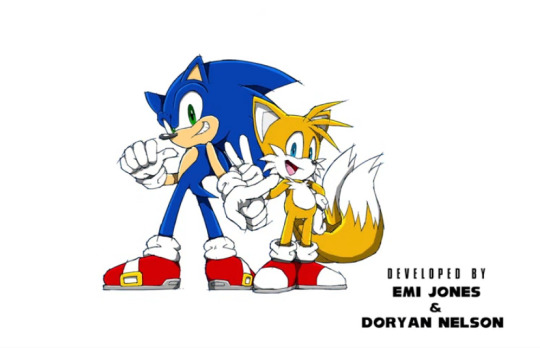
Warning: This will contain massive spoilers for the short radio play series of Sonic & Tails R. If you haven’t listened to the radio play yet on Youtube, I’d highly recommend any hardcore Sonic fan who hasn’t seen it check it out. It’s one Hell of a treat.
For as far back as I can remember in my childhood, Tails’ story of trying to step outta Sonic’s shadow has been such a resonating one for myself. Even when I was a much younger kid playing my Dreamcast, during entries like Sonic Adventure 1 & 2, there was some idea lingering about why Tails just stood out more emotionally in his journey to grow beyond depending on Sonic all the time for help. Now here I am a young adult in my late twenties having such a deeper appreciation of this little two tailed genius kiddo because he’s got an important element that’s made him so beloved for good reason.
In spite of his genius being a rival to that of Eggman’s high IQ and of course proving to surpass it plenty of times when scenarios boil down to being a high stakes battle, Miles Tails Prower beneath it all is still just like any one of us. We’re all trying to find our place in this world about what defines us for who we are as unique people. He wants to be more than just seen as someone who’s alongside Sonic The Hedgehog’s never say die attitude, but prove he’s plenty capable of standing on his own two feet to protect everything the kid holds dear to himself. Underdog stories, when they’re naturally executed very well, can reel me in so easily. They are very much my bread & butter trope I adore seeing.
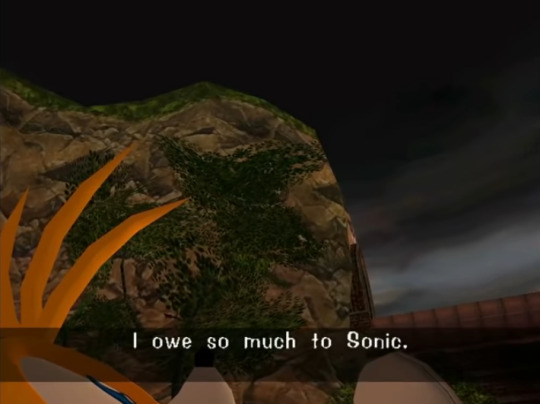
To no one’s surprise, the two Sonic Adventure’s iterations portrayal of Tails’ characterization are hands down some of my favorite writing for the two tailed fox, regarding what the 3D era has done toward him, development wise. It gave him more of an existential struggle to endure like, “What happens when Sonic isn’t around to help stop Eggman? What if I’m not strong enough to accomplish what he can?”, making Tails plight to be seen as an equal all the more endearing when stopping Eggman in his climatic battle against the Egg Walker in Station Square. This here is a great use of a timeless lesson you can apply in life that if you set you heart and mind on anything, there isn’t a thing you can’t accomplish on your own, which is why many fell in love with Sonic Adventure 1 & 2′s writing for Miles Tails Prower’s journey of independence.
As someone who comes from a large family tree of relatives, I feel the weight of my existence on my shoulders at a number of points more than I’d care to count, admittedly. Seeing Tails struggle with his sense of purpose, in contrast to observing how much Sonic has accomplished with his carefree, yet deeply compassionate attitude, means the world to me in watching another trying to comprehend their value as a whole on how much they matter, overall. This is a big part of why my fondness for SA1 & 2′s quality has never wavered over these years, besides still obviously enjoying most of their game play mechanics. People can try to debate to their heart’s content on whether the Adventure games still hold up in their own eyes, but I’ll always respect them for how they tried to develop certain characters, such as Tails, Gamma, and Shadow The Hedgehog notably, to attempt expanding upon their characters, as well as world building.
I won’t bother going into a rant about how Sonic’s recent 3D games have butchered Tails’ personality & relatable nature, due to the current writers in charge of handling the cast of characters. More or less, I greatly empathize toward the notion many have already stated about Tails being so cowardly and God forbid, looking at Lost World, downright severely mean spirited. Rather, I’m obviously writing this lengthy post to breakdown why Sonic & Tails R succeeds, where these certain 3D games have greatly faltered in exploring Tails’ emotional dilemmas as an insecure, yet still having the courage to prove himself, talented boy full of hidden potential he doesn’t quite realize, until his back is against the wall in life threatening situations.
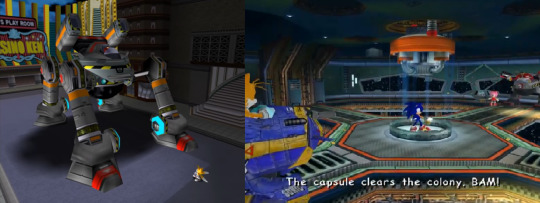
“That day, I realized I couldn’t depend on you forever. Not that I can’t depend on you, but like, “What happens when Sonic isn’t here?”, you know?”
Sonic & Tails R further delves into this fundamental rule of what has defined Tails in Sonic Adventure 1 & 2′s stories of events where Sonic wasn’t there to aid his best bud in taking down Eggman’s evil efforts for global domination, most importantly his fear of defending the Earth without his role model. Besides what I already stated in SA1′s events in Station where he stopped the Egg Walker, as well as the missile Eggman launched from detonating before their climatic battle, Tails watched Sonic blow up in ARK’s capsule presuming him to be dead after Sonic imparted how much faith he has in the kid’s abilities to be truly strong in the face of any foe. Sonic & Tails R manages to use fan service in a way that doesn’t feel like “pandering” for the sake of it, using this past canon material to do more of an in-depth study about Miles’ anxieties of existing without Sonic.
Wouldn’t put it past them if EmuEmi & crew were using SA2′s Sonic death fake out scene in that space capsule to further add trauma to Tails’ psychological attachment to Sonic, as well as his insecurities of depending on him too much, to boot. While it’s never obviously outright stated in their radio play, I definitely believe they were factoring this element into adding dramatic exploration for why Tails is so self-conscious about the worst case scenario of permanently losing Sonic. Watching Sonic supposedly die put Tails into a deeper state of self-reflection, so I very much enjoyed how they went using these past events to create a thorough exploration about him learning just as it’s important to realize you need to stand up for yourself without using someone else as a crutch all the time, it’s doubly important to remember there’s nothing wrong about asking someone for help when you’re about to be down and out with little options left.
Sonic & Tails R beautifully builds upon the foundation these two games’ stories left behind years ago, creating new damn great material to explore with the most iconic characters of this cast, Sonic & Tails brotherly dynamic. I’ve been praising Sonic & Tails R out the wazoo for how well it captured Tails underdog story of overcoming death defying odds, but it managed to remind me how simply adorable and outright wonderfully endearing their brotherly chemistry is as a whole. This is a big friendly reminder Sonic isn’t all about being cocky wise cracking character making meta jokes left and right, but he can be plenty capable of showing serious compassion to anyone he values as an ally and friend. This is no greater evident, than with him verbally lifting Tails up in his time of need when he’s self-depreciating his own significance. It can be seen in Episodes 2, 4, and 7 giving Tails motivational pieces of advice.
Episode 2 In Adabat’s Cavern
-Sonic: Wasn’t it your radar that helped us find these Emerald shards in the first place? How could you be slowing us down when you’ve gotten us this far?
-Tails: But, I...
-Sonic: I could never make something like that. You’re the smartest person I know, Tails. One way or another, we’ll figure this out, count on it.
Episode 4 In Holoska After Helping Silver Save The Chao
-Sonic: So, what was that back there? At the cave, in Adabat?
-Tails: What do you mean?
-Sonic: Frozen stiff. Confidence shot. It’s not like you. It was more than feeling like you were “slowing us down”, right?
Episode 7 Inside The Egg Carrier 3
-Sonic: Let’s split up! I’ll distract them and you can go after the energy source.
-Tails: You’re gonna take them on all by yourself!? Let me help, Sonic!
-Sonic: No time for this, Tails. Stop overthinking and just go! If I can get their attention, I’ll take the heat off of you and that room you’re going to probably won’t have any security. Take this emerald and I’ll take the other one we have. It’ll lead me right to you after I beat these guys.
-Tails: O-Okay...
-Sonic: Hold on, Tails! Listen to me. Don’t stop moving and be careful. I’ll be fine and so will you!
Sonic & Tails R remembers the most crucial detail of their important relationship. One isn’t better than the other and needing to always rely upon that notion for helping one outta a jam, but instead showcases how they’re equals as a team/bros. Sonic may be super fast and strong, however Tails has his intelligence to analyze situations in a different angle Sonic wouldn’t necessarily consider, per say. Which isn’t to say Tails couldn’t put up a fight either, as we’ve seen in SA1 & SA2′s stories where he faced Eggman one on one with no outside help to best him at his own game of wits & strength.
We get see the apex of this idea through Tails facing Eggman in his super improved mecha walker. Although Tails may get thrown for a loop here at first by Eggman, it’s his villainous speech about winners and losers in their world that ironically does the exact opposite of what he intended. Eggman wanted to crush Tails’ sense of self worth before finishing him off, but all it did was reignite the very lesson Sonic told him earlier before running to distract Eggman’s robotic minions. That said lesson of he’s more than capable of facing dangerous threats
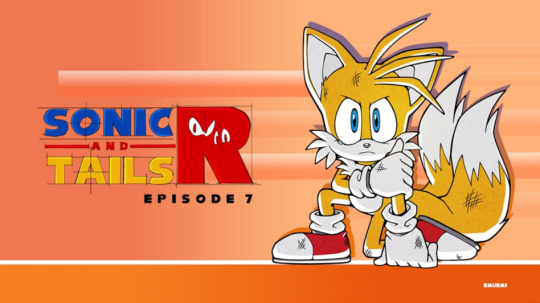
-Eggman: Poor boy. We all have to learn this lesson, sooner or later. In every game there’s no one you can depend on. You’re all alone and you’re either a winner, or a loser. And as you know, loser’s lose all of their lives. Say goodbye, fox!
-Tails: You’re wrong! I can depend Sonic! I won’t let him down! I can’t because...Because he’s depending on me! And because of that I won’t lose to you!
This radio play strikes a good balance in utilizing the grey moral area about depending on someone vs it being an unhealthy display of attachment derived from serious insecurity. Word’s can’t begin to describe how much I loved this moment to pieces because it’s oh so important for writing Tails’ characterization. If you’re going to tackle him being super self conscious about his reliance on Sonic, then you gotta remember why they are so close to one another to begin with. Sonic & Tails have an unbreakable connection, considering they’ve brought out their best qualities in themselves from being together as individuals. For Sonic, it’s his older brother compassion to Tails to bring him outta feeling melancholy. For Tails, the kid finally understands there isn’t anything wrong with depending on Sonic when he needs it most.
After all, that’s what a real healthy friendship is all about. Whether you’re giving someone a dose of tough love, or simply a piece of motivational advice, it defines how much you truly care about someone, period. Sonic & Tails have this very same power from their bond, which is why new emeralds form from their compassionate friendship that hasn’t been shaken after all the years they’ve been together. Another detail worth noting is it adds to the lore in an impactful manner when Tikal expresses in Episode 8 about positive connections and thoughts from users of the Chaos Emeralds having a strong will & heart. Using the ideas they had for encapsulating Sonic & Tails’ dynamic to create new emeralds from their love for each other as brothers adds an emotional weight.
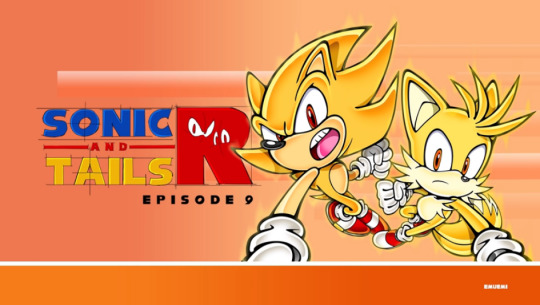
“So, Sonic’s not the only one who harness the power of the Chaos Emeralds? I can too!?”
“Yes, you have a strong heart! There is a power waiting to be unlocked within you, as well.”
I’d always daydreamed about in my childhood seeing Super Sonic & Tails take down a threatening villain, whether it was Eggman or different powerful creature such as Chaos or the Biolizard. You can imagine how fucking giddy I was beyond belief to see this artwork of Episode 9′s cover for the radio play. Tails not only got to have another one on one with Eggman, but a team up with Super Sonic in his own respective Super form? Sign me the Hell up! Talk about an all you eat buffet of good writing for Tails’ journey reaching its climax. Getting to hear this play out, alongside the amazing song of Fly With Me, made it authentically feel like something straight outta if there were an installment of Sonic Adventure 3 being brought into reality, which certainly feels like it now.
Episode 9 has so much awesome stuff with Sonic & Tails working together in their super forms. Particularly, my favorite scene is at the beginning when Sonic teaches Tails how to navigate his newly acquired speed in his respective Super form. My heart melted hearing Sonic help Tails through it all, while he was overjoyed about how fun this new form is for himself. Wholesome Sonic & Tails content is the perfect daily serotonin for me, easily. It’s an awesome fun fact to know they used a scrapped boss from Tails Tornado segment in SA1 for Eggman’s flying dragon three headed robot in their big final battle, once again using old canon material in a very effective manner to boost the quality of their fan made story.
It’s been a real thrill to hear Mike Pollock play a straight forward serious Eggman making my day in more ways than one, considering that’s another thing I’ve been yearning for desperately besides Tails being a competent character again. His performance in Episode 9 when Eggman gave that speech about how long he’s been at odds with Sonic & Tails stubborn will power was simply excellent. The moment he told his mechanical dragon to crush them I got serious chills. That’s the Eggman I remember and grew up with. He could be a hammy villain sure, but Eggman wasn’t a doormat that could be swiftly beaten. Robotnik can be considered a serious threat in his own right and this radio play nailed it down to the very letter with how much he predicted their actions.
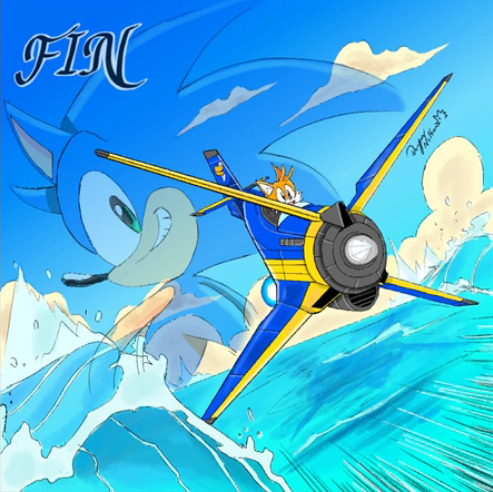
“Sonic, all I ever wanted to do was be like you. You’re not scared of anyone or anything. I could never be like that. At least, so I thought. I grew from that, but then I got so caught up in trying to prove it that thought it wasn’t okay to depend upon anyone, especially you. I just didn’t want to be that scared little kid in Station Square anymore, but now I understand. It’s okay to depend on your friends. It all means is that we’re stronger together, so the next time Eggman comes back and wants to start any trouble with you, or any of my friends. Emeralds or no emeralds, he’s gonna have to get past me and he won’t!”
Sonic By Episode 1′s End: Aww, yeah! Adventure, here we come!
Tails By Episode 10′s End: Aww, yeah! Adventure, here I come!
Turn your thoughts into power. Be all that you can be.
The ending legit got me choked up because what of they decided to do for wrapping up Tails journey in a poetic fashion. Having Tails go off on his own separate journey to grow more independence pulled on my heart strings perfectly. Very much so, as I’m transitioning slowly, but surely, into gaining more freedom to go out into the outside world in my own life. Concluding the story, by Sonic & Tails holding onto the two Emeralds their bond had formed from positive energy, due to their powerful friendship, was so heartwarming. This is how you write an overview of what makes Sonic & Tails chemistry work so well as it does.
Sonic & Tails R’s ending represents while some things never change, like Sonic and Tails bond for each other, it also shows there’s very much a necessity for people to grow, hence Tails’ whole solo journey in the epilogue. People can’t stay in the same place forever and will need go about finding their own path, even if it means saying “goodbye” periodically for a notable amount of time.
It’s for these reasons I’ve listed in great explanation above throughout this detailed post cement Sonic & Tails R high on my list of favorite Sonic fan projects. They captured the magic of what made the Adventure games so beloved. Gonna be looking back on this passion project for many years to come. Everyone involved in this year long effort of a project dating all the way back Summer of 2020 ought to be immensely proud for how much their hard efforts paid off in the long run.
Thanks for taking the time to read my thoughts here!
Hope you enjoyed.
#sonic and tails r#emuemi#sonic the hedgehog#miles tails prower#sonic analysis#long post#dr eggman#sonic adventure#sonic adventure 2#this fan project means so much to me#everyone poured their heart and soul into it
60 notes
·
View notes
Note
you may have already answered this kind of question so i apologize if you have, but i’m wondering what you think a majority of comic fans miss with understanding subtext and characters? like outside of what you’ve already spoken about (personal headcanons and feelings) is it just that a lot of fans don’t have the media literacy they think they do? or just newer fans that have only read the most popular series. i only ask bc sometimes i worry i don’t know if i’m reading between the lines correctly and if you’d share like.. ig your process for drawing conclusions ab characters? i feel like i may have answered my own question here LOL
ah, no, i've never spoken about this at length and i'm honestly flattered you reached out, thank you! i don't have a process per se, i think my interest in engaging with comics the way i do comes from doing film studies at uni and seeing the two mediums as having more common ground than with literature per se due to the visual doing the heavy lifting but i do sincerely believe that anyone can read the text as it's meant to be understood if they only apply themselves -- and the fact of the matter is that many people don't.
i'd say you got it in one, it's a case of both overestimating and underestimating their media literacy and i think a lot of the time particularly fandom-y blogs see things that simply aren't there and try to write meta that serves their purposes rather than shed some light on the text they're talking about. the way i see it, there's three fundamental questions to ask yourself before getting started on any comics analysis worth its salt
1) what's the objective reality of this?
2) is this a common trope/phrase? is it evocative of or a homage to a certain piece of media that has entered the basic pop culture lexicon?
3) how much of the author spilled into this?
and to elaborate on that:
1) before you get to the subtext, it's only natural to build up on a foundation of facts. i mean, the really basic stuff -- who, what, when, why.
for example, looking at my recent posts regarding hal jordan's timeline, take his stories in the flash (1959) backups running throughout #220 - 246. he's coming off a year-long road trip with ollie queen and he's been unemployed the entire time, he's not only broke but living in poverty, he's depressed. none of this is a great feat of analysis, these are all facts verbally stated by the character with the sole exception of the last one -- but how do we know that? several stories have hal's will faltering, several others see him having difficulties scrounging up enough money for food let alone a roof over his head. logic dictates that his circumstances affect his mental health.
sometimes it really is purely about recognising what's right in front of you and putting it in context, you can't talk about these backups without talking about what preceded them (the hard travelling heroes era) because they do not exist in a vacuum. unless you're talking about an elseworlds/one-shot/limited series/complete run from start to finish it's absolutely impossible to properly engage without context, that's also where the common misconception that comic book timelines are confusing comes from.
2) i don't expect people to just be naturally born with this knowledge but i think it's pretty easy to get a sense of what's a reference (even if it's not one you recognise) and what's not and making an effort to research that, even if it's just a quick google search. this is a common complaint i've seen in attempted meta of tom king's work on here so let me bring up some examples from his recent mature books
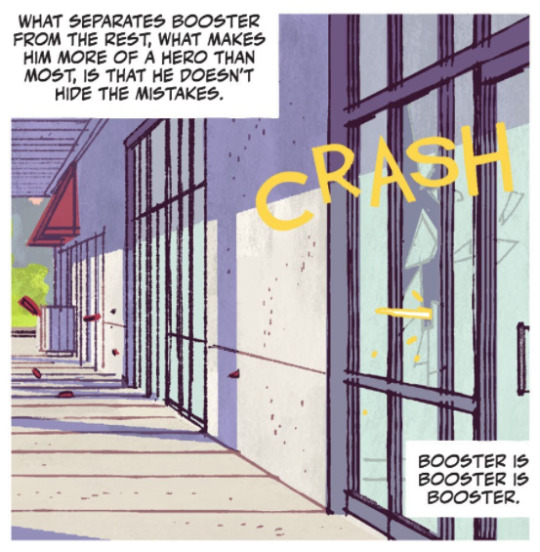
(the human target 2021 #3)
"booster is booster is booster" isn't merely repetition for the sake of repetition but very obviously a play on the common "a rose is a rose is a rose" phrase, which has been used in all media for decades now and yet was brought up in at least five different posts on here as an example of 'bad writing' (regarding the literal structure of it) rather than just owning up to their lack of knowledge.
and this also applies to shot-for-shot recreations such as mr terrific's scene with alanna strange's dad
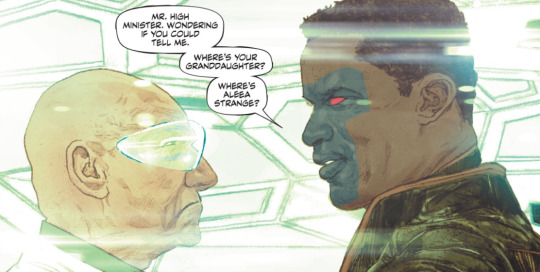
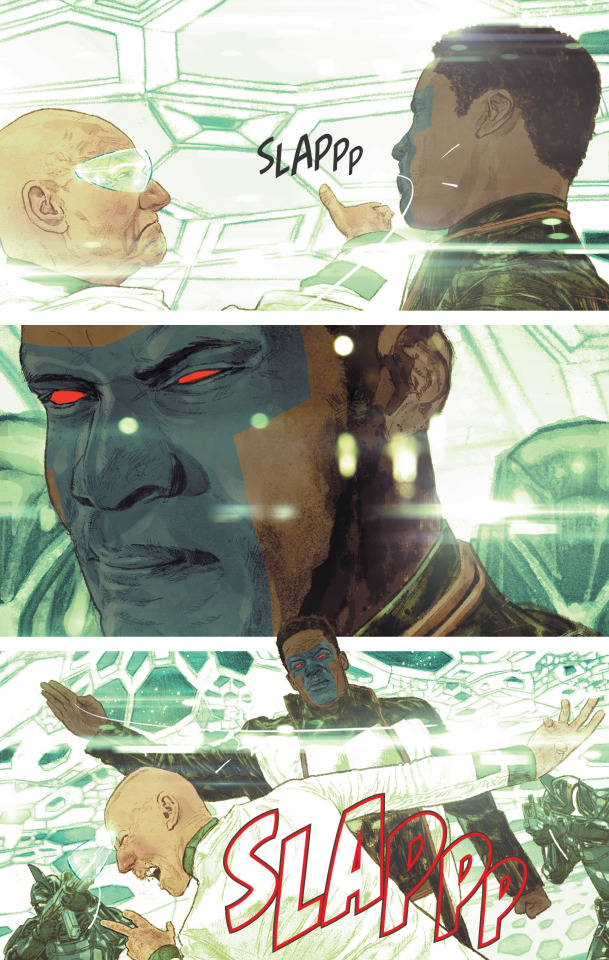
and how it's an acknowledged reference/homage to sidney poitier in in the heat of the night (1967)
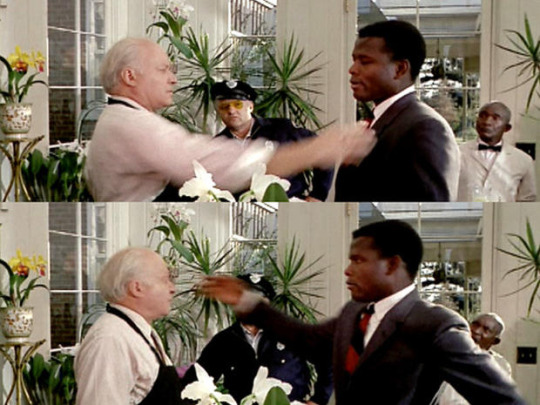
and all that says about the role mr terrific plays within strange adventures' narrative. again, this is knowledge better researched if not immediately recognised and you'll often find it mentioned in issue reviews if necessary.
3) as we all know, comics are a collaborative effort like nearly no other piece of art. the finished product is not only the work of the writer, artist, inker, colorist & letterer (all of which play vital roles in the process) but that of the editor as well and this is another instance where 'doesn't take place in a vacuum' applies. i'm all for death of the author but the direction a character is heading is definitely informed by the entire creative team's experiences and expectations, i think it's worth investigating what the people in question have had to say about it -- especially regarding an older comic -- after you've formed your own opinions.
there's cases where the writers make conscious decisions to disguise their opinions or where they're coming from and their success varies (take chuck dixon's work on connor hawke vs gerard jones' horrific depiction of arisia rrab) but there's also comics that are infinitely made better because the writer in question relates deeply to the characters they're writing (look at tom king's very personal depictions of mental health or keith giffen's insistence on giving an air of genuine reality to any working class character), that's even setting aside cases of gay characters being written by straight writers and so on. here, i'd sincerely recommend drawing a line between what's just another job for somebody and what's mattered to them intensely and if you want to take your engagement this far then it's definitely vital to check interviews, comic magazines, etc etc.
so yeah, here's a little look into my line of thinking! i hope it helps some and i'm sure you're doing just great if you're concerned about this to begin with :)
16 notes
·
View notes
Note
hi this might sound random but do you think idw series handled female characters well? arcee obviously was handled in a really terrible way but furman was in charge of the series back then and we didn't have any female characters besides arcee thanks to him, so i wonder what you think of post-furman era writers and the way they wrote / handled women
this is actually a really good question! i’ve actually been wanting to talk a little about how i think comics handled the female characters.
putting aside my favoritism and personal opinions on them, female characters in the IDW comics (at least the first run, i have smaller knowledge on IDW2 so i won’t be focusing on it here) are still a minority when in count with how many male characters there are. granted this was because of simon furman’s refusal to use female characters when the run was under his pen (which is why when you read the G1 comics, you will find that there are absolutely no female characters. that isn’t a joke; there’s literally no girls!) and it was under his pen for quite some time. arcee at her introduction was obviously poorly handled. there’s no doubt about it. but i’m gonna avoid talking about that and get to the point where we had more female characters.
windblade was our first female character to star in a protagonist role; she was heavily advertised as such! but then you read her runs, and…yeah, they focus a lot on starscream and male characters instead of her. from a more snobbish perspective if i so will, nothing was given to windblade that would make others care about her—her struggles weren’t really unique, she didn’t really have a unique dynamic with other characters (and the one she did have one with, chromia, was literally sent on a bus out the run)…she was very palpable to the average audience. and i think that was intentional, even if i am giving the writer more credit than she deserves: windblade’s existence was already controversial, and if they had taken the chance to make her a lot more flawed or dynamic, then people would dislike her a lot more.
but i still don’t think it’s good. windblade was put on spotlight like she would be THE female protagonist. SHE would impact the story. but she really doesn’t? i like to overanalyze her but it’s clear what she was made to be: easy to project on. and that’s not a bad thing—bumblebee is also made to be a little self-projectable if we’re being honest—but she’s noticeably barebones in contrast to the various male protagonists we’ve gotten. granted, we’ve known the male protagonists for years most likely, meaning their personalities were already established, but…that’s what her OWN run was supposed to do! not focus on the villain a majority of time! windblade’s friends who were also girls were literally kicked out of the run in order to focus on the male characters. we never learn anything about her other than what we were told she was at the start.
and this is a reoccurring issue. windblade doesn’t really go through any development. chromia was kicked out the moment her character was becoming something more. airazor was only introduced to talk about tigatron and her relationship with him. elita-one was there and it was obvious the people writing her didn’t really enjoy writing her. etc etc.
and when i get to arcee, nautica, velocity, and co. i’m mixed. arcee is a strange case, but she thankfully has some really good development in the later half of the story. nautica is adorable and i love how seamlessly she blended into the cast…but i wish she got more focus. velocity i feel the same way but she got even less time. these girls are written fine, but…not exceptionally? they’re are average and that’s fine. not all characters have to be expert character study pieces. but it feels…just okay? i don’t know.
this got really ramble-y but TL;DR the IDW1 comics handled the female characters in an average way. i wish they had been given a lot more than they were; i wish windblade’s run did her justice; i wish nautica had more substance and we saw things from her perspective more, especially about skids; i wish for a lot of things. i don’t think it’s bad but like it’s definitely not my favorite.
13 notes
·
View notes
Text
this post is a product of its time
tw: discussion of racism, homophobia, misogyny and a short mention of sexual abuse.
ok, this is basically gonna be a very long rambling post about my not fully developed thoughts on the justification many people give to bigotry when talking about the past: "it was a product of its time"
it would be fair to say, with me being a raging SJW socialist scumbag, that I don't think this is a very good argument and is most of the time actually an excuse to not think about the problems inherent to our society, historical or not, and, by extension, the problems with ourselves. but I do think that sometimes, just sometimes, this can be a valid point, or at least one that raises some interesting questions.
I'm going to cite examples from several pieces of media, but fear not, I'll try to make this as accesible as I can.
so, let's take Star Trek: The Original Series (TOS) as our first case study. this show has, correctly, been called progressive by everyone except for clueless people who don't know much about Star Trek's history, Star Trek's crew, Star Trek's cast, or, frankly, Star Trek. because if you ignore the clear, sometimes in-your-face political history and present of the franchise, I don't think you know much about it at all. I do think you can call yourself a fan if you like it, you may have watched every single episode for all I know. but lots of mental gymnastics are needed to ignore the political progressiveness Star Trek has had since its very beginning.
episodes like Let That Be Your Last Battlefield are obviously anti-racist, at least in their intention. but the episode in question really is "a product of its time," and at the very end fails to uphold its ideals. the episode ends with the two aliens (who are LITERALLY. BLACK ON ONE SIDE. AND WHITE ON THE OTHER. BUT IN THE OPPOSITE SIDES.) fighting each other on their devastated planet, and the crew is like, "oh yeah if they both would give up on their hatred that they both share both of them equally" when it has been firmly established that one is the oppressor and the other one is the oppressed.

and that's a lot of Star Trek, not just TOS. even Discovery, one of the most recent series, has done Bury Your Gays (and Trans) TWICE (though both times literally rectified it, which is cool). there are episodes of the franchise that are overtly racist, or misogynistic, etc. TOS is lauded, mostly justifiably, as very progressive, especially for the standards of the time. they put a woman of colour as one of the senior staff, for fuck's sake. of course, when you analyse that same character, as with most of their intentions at being progressive, you'll see that she was relegated and sometimes even outright mistreated when she had the potential to be much more. but, at that time, it was a lot.
I had a friend (emphasis on "had") who, after I told him about TOS's both progressiveness and constant misogyny, told me something like "imagine feminists trying to complain about a show from the 60s." so, with unearned spite, he was, in some way, trying to make the argument that it was a product of its time.
you could say Star Trek, all of Star Trek, is "a product of its time" in the sense that it's not always perfect. uh, yes, I would agree. but that doesn't mean people have to accept it. well, I mean, the show is kinda over, you have to accept it's that way. but you don't have to accept that it's not wrong just because it was a product of its time.
H. P. Lovecraft, as another example, was a greatly influential writer whose works still shape a lot of people's ideas to this day. I have only ever read like one of his stories, so don't expect me to have an opinion on his works. but I can have an opinion on what I know about him as a person (he did have a life outside his writing, after all). and, yeah, he was a huge asshole. if you want to know more in depth about the subject, please watch Hbomberguy's video on him: https://www.youtube.com/watch?v=l8u8wZ0WvxI

but basically, he was incredibly racist & homophobic. some people might even say, "he was a product of his time." well, there are two possible rebuttals to that. the surface level one, and the one that examines why that argument is wrong to the core.
The Surface Level Response to "it was a product of its time": um, no it wasn't. Lovecraft was more racist than a lot of people even in his time. he wasn't just a guy who carried the racist beliefs of his society like everyone else, he was a reactionary who actively thought and discussed how racist he was, and how right he was for being that way. but that's only applicable to Lovecraft. one can't argue the same for Star Trek: TOS, because TOS did try to be more progressive and more anti-racist than the rest of its society. that leads us to the next response.
The Response that Actually Deals with the Fact that No Matter How Progressive You're Trying to Be, Your Failings Can Still be Criticized: the thing is, trying to excuse Lovecraft's or Star Trek's bigotry because they were "products of their times" misses the fact that racism is still wrong, and some people knew that in those times as well. people from these times weren't all naive or stupid or whatever. they had the capacity for rational thinking. they could stop and think, "hey, maybe what we're doing is wrong." and the fact is, some people did. not perfectly, not to our standars, but they did. everyone could have stopped and think. but most of them didn't, and we can criticize them for it. racism, homophobia, sexism, etc. HURT PEOPLE. horribly. massively.
also, even if you agree with the "it's a product of its time" argument, some people aren't criticising people's or work's bigotry: they're explaining why they don't want to experience it.
The Talons of Weng-Chiang is a 1977 Doctor Who serial, and it's one of the show's more racist stories. almost all the villains are Chinese, every single Chinese person is a villain. there's yellowface, slurs, stereotypes, the Doctor speaking nonsense words instead of actual Chinese, and a general belittling of Chinese culture.

note that I'm neither Chinese nor of Chinese descent. I have been searching for hours for a few posts I've read a while ago (some by people who are of Asian descent) about this episode and I can't find them. sorry.
suffice it to say, even though I love Jago & Litefoot (the audio series and the characters), it's not an acceptable episode at all. but it's also important to remark that, because of it, some people aren't going to want to watch it. sometimes, people aren't saying "the episode shouldn't be this way," which causes others to answer that it was "a product of its time." sometimes, people are just saying, "this is an episode that attacks real people. I don't want to see it. I don't care if it was common in that era to be racist, i don't want to experience it."
however, there is an interesting point to the "it's a product of its time" argument. after all, everything is influenced by its society, for better or worse. and we can't change it anymore. TOS sometimes didn't quite understand the political themes it wanted to explore. Lovecraft was a horrible bigot. Talons was racist towards Chinese folks. and that's that. I don't think we should change the episodes/stories or anything. edit them in any way. that would be, in a sense, changing history. and we wouldn't learn anything from it, about how we can do better.
I think there are two solutions to this:
1. warnings before starting the text: this was done with The Talons of Weng-Chiang. on Britbox, where you can watch Classic Who, this serial has a content warning before the start. that's good.
2. the removal as a whole of the text from some places: I think before applying this one, there should be a lot of thought put into each case. I don't think removing a whole serial of Doctor Who or Lovecraft's stories from anything would be, well, fair. especially on tv episodes a lot more people worked on those, not just the writers and the directors. Lovecraft's writing influenced thousands. we shouldn't erase them or anything. but sometimes, for some cases, we should.
those in the US might seen a Confederate statue being taken down. that is, in a way, a form of removal of a piece of history.

but that is a good removal. statues glorify. one sees a statue and probably thinks "this was a person worthy of admiration." they should be taken down, maybe even with a permanent mark of why this was done (a plaque that reads "a statue of X was here, but he didn't deserve it because of Y" could be put in place of the statues, for example).
another example is the removal from DVDs of the short episode A Fix with Sontarans, a Sixth Doctor minisode that featured Jimmy Savile, a presenter who was later found out to be sexually abusing children.
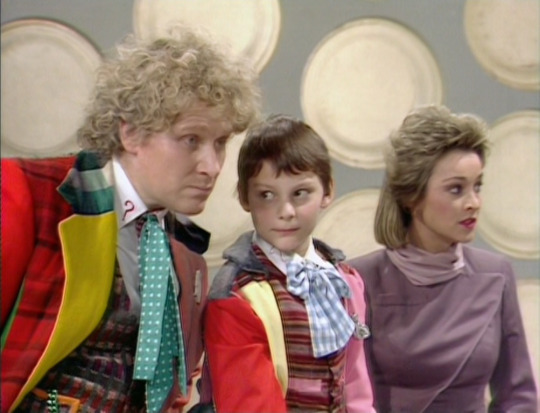
the removal of that minisode is good, actually. it's not a full episode (it's not even Doctor Who). some might say that's "erasing history" but, like, you can still find it online or information about it if you want. this minisode deserves removal from DVDs and Blu-Rays and whatever more than content warnings. it's not an important part of the show and it prominently features a horrible person who did horrible things during that time.
so, after all that, I have explained why I don't like the "it's a product of its time" argument. it is an interesting point that deserves to be examined, but it's not very good.
I have had this in Drafts for so long I've probably forgot some of the points I was going to make, but eh, what can you do? hope you enjoyed reading this.
bye
#THIS POST IS A PRODUCT OF ITS TIME#IMAGINE FEMINISTS TRYING TO COMPLAIN ABOUT A POST FROM THE 2020S#THERE WAS A LOT OF MISOGINY BACK THEN#AND RACISM TOO#BUT THERE'S NO NEED TO THINK ABOUT ANY OF THAT ANYMORE#GO BACK TO SLEEP#CLOSE YOUR EYES#star trek#star trek tos#tos#the original series#star trek the original series#Let That Be Your Last Battlefield#lovecraft#hp lovecraft#h p lovecraft#doctor who#classic doctor who#classic who#fourth doctor#4th doctor#4#four#the talons of weng-chiang#talons of weng-chiang#jago#litefoot#jago and litefoot#jago & litefoot#a fix with sontarans
35 notes
·
View notes
Text
hargrieve’s fic recs — september
happy unnaturally warm autumn! climate change is upon us! I am indoors and I keep reading and reading and reading. I'm kind of going through a kpop phase right now (three guesses as to who my biases are based on the fic below lmao). even though haikyuu did sink its hooks into me for like eight months, I initially started this fic rec series last year to keep track of my wandering hyperfixations, so here we are with my first major fandom swerve of the year! do not worry, haikyuu readers, I will be back for you so soon. season 5 when
(but seriously, txt blogs please hit me up, I am desperate)
@ravenclawboys <3
FANDOMS: HAIKYUU!!, BTS, TOMORROW X TOGETHER
Haikyuu!! recs:
zero to hero by sketchedsmiles
akagin; rated T+; 18.8k words; 1/1; gin pov
superhero au :) civilian gin is saved by masked superhero akagi
i’m a sucker for any and all superhero au’s but this one is especially well-done. i loved gin’s voice and akagi’s characterization and the way everything ties back together in the end :)
featuring miya atsumu who won’t stop chasing superheroes sightings on internet forums and kita shinsuke trying to shut down his posts
BTS recs:
let the waves chase us down by watchtheleaves @noctiluka
namjoon/seokjin/hoseok; rated T+; 5.7k words; 1/1; namjoon pov
summer camp counselor au. namjoon is sick in bed all day
a short but very complete au featuring ot7. one of my favorite things about this fic is that instead of the camp counselor setting being used as a get-together trope, each character (particularly hyung line) really has an established place in this universe
2seok are so sweet to classic overthinking namjoon
love is no big truth by venusghost
vmin, namkook; rated M; 3.6k words; 1/1; namjoon pov
in which an aghast and appalled namjoon can’t stop third-wheeling cosmic soulmates vmin. canon compliant, boy with luv era
“Be the leader of the group, they said. With your temperament, it’ll be easy, they said.“
SHORT HILARIOUS WONDERFUL READ that so captures the essence of both vmin soulmate behavior and kim namjoon’s philosophies on love. and also being in the wrong place at the wrong time
on earth we're briefly gorgeous by notyoongs
hopekook; rated T+; 17.8k words; 1/1; hoseok pov
hogwarts au in which charming hufflepuff quidditch player hoseok is a seventh-year and super shy ex-student jungkook is a ghost who has a big crush on him
as much as this is a cute hopekook fic, it is also a story about growth and spending time with the people you love and finding what makes you happy
kind of sad, as one would expect from a ship where one of them is a dead ghost, but it is very heartwarming. 10/10 cute
over + under by honeyboyyoon
vmin; rated E; 28.6k words; 1/1; taehyung pov
soulmate au where vmin are not soulmates
writer taehyung and the many painful ways in which he loves his not-soulmate jimin
my favorite thing was the imagery in the fic. I’m obsessed with the way the author writes weather and color and sensation into metaphor. pure prose poetry
TXT recs:
you wouldn't do it, but i just might by renaissances
yeonbin; rated T+; 17k words; 1/1; yeonjun pov
canon compliant trainee/pre-debut era. non-linear narrative where half the story is forward on the day that yeonjun’s introduction film was released in 2019 and half the story is in flashbacks
time-skipping narrative done extremely well. a yeonjun character study where he reconciles 1) the fact that he was bighit’s top-ranked legendary trainee, 2) the fact that soobin was named txt’s leader over him, and 3) his feelings for soobin
if any of you were around for when I cried over hatsuna’s “I wish to live in a world” back in march, I felt exactly the same emotions reading this. 10000/10 I love ao3 renaissance’s writing style and pacing and development so much
I feel like if you’ve been in the txt fandom longer than I have (and you definitely have), you’ve already read this
recs I received in my inbox (all for haikyuu!!):
a liar’s truth by internetpistol
sakuatsu; rated E; 50k words; 2/2
summary: “In which Sakusa Kiyoomi is raised to believe that gay people go to hell but then takes one look at Miya Atsumu and thinks, then why the hell did God make them so fucking hot?”
bound by internetpistol
sakuatsu; rated E; 68k words; 3/3
summary: “Miya Atsumu and Sakusa Kiyoomi get cast in a gay film together where they, in the words of The Great Philosopher Rihanna, fell in love in a hopeless place.”
one more time, with feeling by liliapocalypse
sakuatsu; rated T+; 15k words; 1/1
summary: “Kiyoomi has a crush, but there’s just one, tiny problem: he basically malfunctions around his senpai. So when he finds out that his high school rival and now college batchmate is actually a shapeshifter, he swallows his pride for a favor: he asks Atsumu to shapeshift as his crush and be his practice date.”
your ivy grows by sketchedsmiles
matsuhana; rated T+; 11k words; 1/1
summary: “When Hanamaki Takahiro shows up on Matsukawa’s doorstep after being fired from his second job in a row, it’s instinctual for Matsukawa to offer him a place to stay until he gets back on his feet again. // It doesn’t take long for the cracks in Hanamaki’s cheerful and upbeat exterior to appear, and it is up to Matsukawa to keep his best friend from falling over the edge completely.”
my twitter
past fic recs
send me a rec!
>> honestly, since these are no longer haikyuu-only lists, if you have any recent faves from your favorite fandoms, go ahead and pop them into my inbox and I will properly tag them when I post
#haikyuu#bts#bangtan sonyeondan#tomorrow x together#txt#haikyuu fic recs#bts fic recs#bangtan fic recs#tomorrow x together fic recs#txt fic recs#akagin#sakuatsu#matsuhana#vmin#namjinseok#namkook#hopekook#yeonbin#hargrieve's fic recs#mine
28 notes
·
View notes
Note
this might be a strange question but do you think that there is a sexual identity in loving God / being in love with Jesus? for a long time I have thought about how I want to incorporate Jesus into every part of my life and every area while at the same time it just comes natural to me to have my eyes trained on him, I've even thought about becoming a nun.. I just feel wholly in love with Jesus but I genuinely struggle with this aspect.. maybe you can't help but if you have any advice or just thoughts that would be greatly appreciated!!
Hi, I'm absolutely obsessed with this question. You're amazing. The answer is yes, so many people throughout the centuries have felt similar ways!
Devoting yourself to God/Jesus rather than having romantic/sexual relationships with other people is not new, and in some ways you could totally call it an identity! In the Bible, we can look at Jesus himself, who (as far as we know) never married, but devoted his life to his ministry. I don't know off the top of my head how many apostles were married (I know Peter had a mother-in-law), but I'm sure some of them gave up that kind of life to follow him. Many priests/pastors, monks, and nuns are unmarried, for various reasons across denominations, but especially when we're talking about monks/nuns—nuns are often referred to as being "married to Jesus!"
Mysticism is the area of Christianity that I would say most incorporated this idea, especially sexuality-wise, and I don't know a ton about it but have included a lot of resources (either read by me or recommended by others).
Becoming a nun is a wonderful, holy calling, and it may be the thing that brings you the most peace! I'd encourage you to do more research and maybe visit an abbey/convent!
Besides that, incorporating Jesus in all areas of your life is absolutely amazing and will probably be overwhelming and beautiful and frustrating and so, so worth it.
I don't have much advice besides to go for it? Like as far as I can tell, you're experiencing a good thing that you feel really connected to! Obviously any serious religious devotion in ~today's world~ takes extra courage and explanation, because this isn't the norm (at least where I live), but, with God's help, I know that you can create a beautiful life for yourself.
I do wanna say that devoting your life to Jesus does not necessarily mean being celibate. Choosing that can be really challenging, especially without a formal path (like being a nun), and while it's a historic, holy way of life, it isn't something to take lightly and can result in a lot of loneliness. Don't deny yourself romantic/sexual intimacy with other people unless that's for sure the path you're on. That said, platonic intimacy is holy and not lesser-than romance, and being single is obviously a normal way of existence.
Some resources you may find interesting:
Church, Christianity, and the long shadow of "hot Jesus," Lyz Lenz, Vox
What Is It Like Being Married to Jesus?, Helena Burns, Berkley Center
Loving Jesus Back: Nuns Really Do Get Married, Jane Thomas, icthus
Sex and the Saintly, Andrew Kinney, Trinitonian
Jesus's Vagina: A Medieval Meditation, Emily Swan, Solus Jesus
Sex and Mysticism, Matthew Milliner, First Things
Erotic Spirituality, Paul Smith, Integral Christian Network
Marrying Jesus: Brides and the Bridegroom in Medieval Women's Religious Literature by Rabia Gregory
Mysticism and Sexuality by Bernard McGinn
Human interpersonal relationships and the love of the Trinity by Maria L Boccia
Erotic and Nuptial Imagery by Louise Nelstrop
Love Divine: Erotic Desires in Christian Mysticism, Prof. David Albertson, Condon Lecture Series
A Practical Guide to Becoming a Nun by Blair Hurley (short story)
Freeing Jesus: Rediscovering Jesus as Friend, Teacher, Savior, Lord, Way, and Presence by Diana Butler Bass
The Naked Now: Learning to See as the Mystics See by RIchard Rohr
Why the Mystics Matter Now by Frederick Bauerschmidt
For the Love of God: The Faith and Future of the American Nun by Lucy Kaylin
Sisters: Catholic Nuns and the Making of America by John J. Fialka
Mariette in Ecstasy by Ron Hansen
The New Asceticism: Sexuality, Gender, and the Quest for God by Sarah Coakley
Women and Mystical Experience in the Middle Ages by Frances Beer
Fragmentation and Redemption: Essays on Gender and the Human Body in Medieval Religion by Caroline Walker Bynum
Authority and the Female Body in the Writings of Julian of Norwich and Margery Kempe by Liz Herbert McAvoy
The Love of Learning and the Desire for God: A Study of Monastic Culture by Jean Leclercq
Roots of Christian Mysticism: Texts from Patristic Era with Commentary by Olivier Clement, Jean-Claude Barreau, trans. Theodore Berkley
Scivias by Hildegard von Bingen, trans. Hart & Bishop
I think that's all I got! Wishing you love and peace as you discern God's path for you!
<3 Johanna
54 notes
·
View notes
Photo

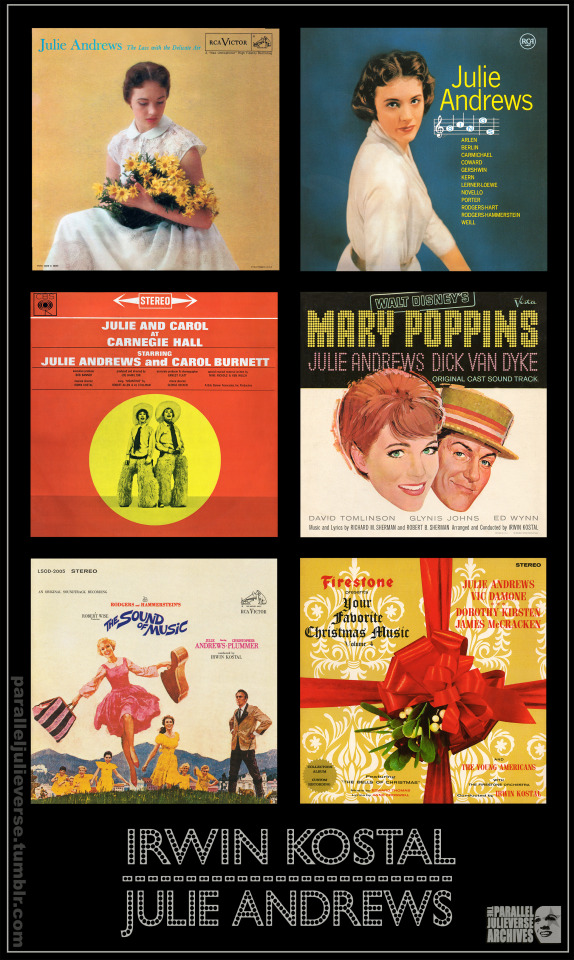

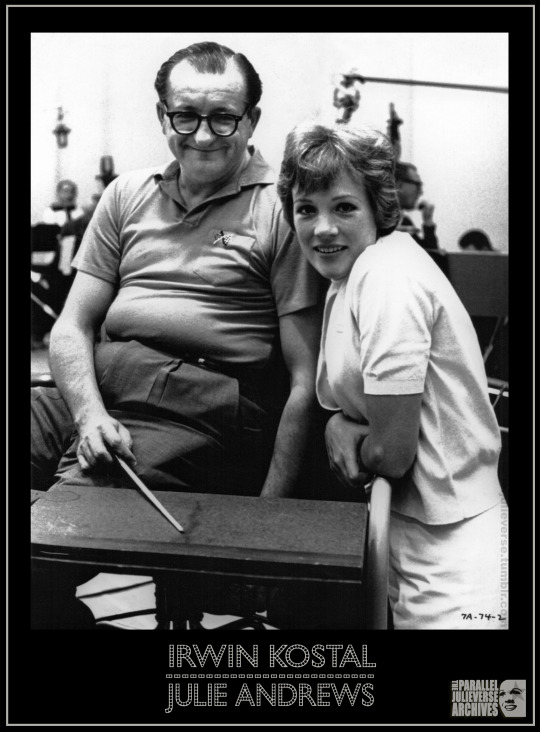
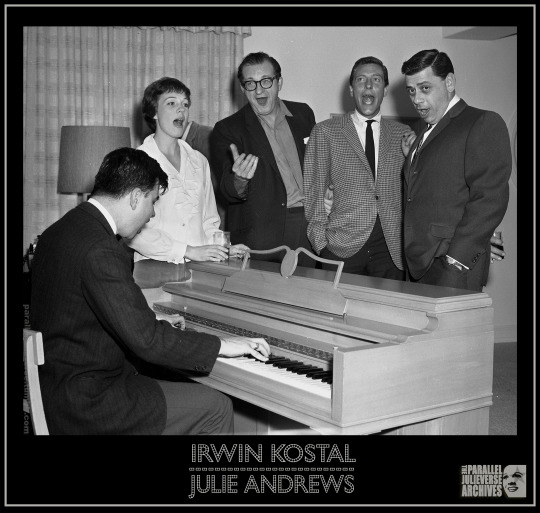
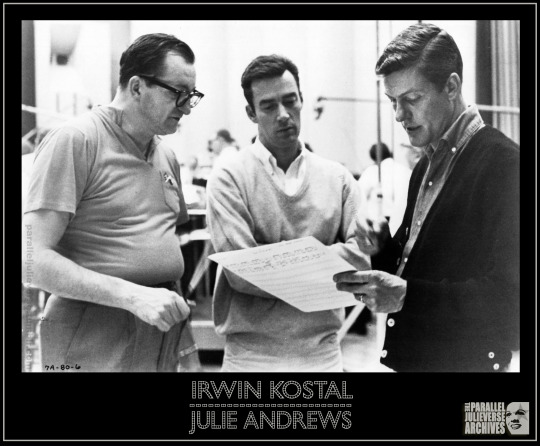
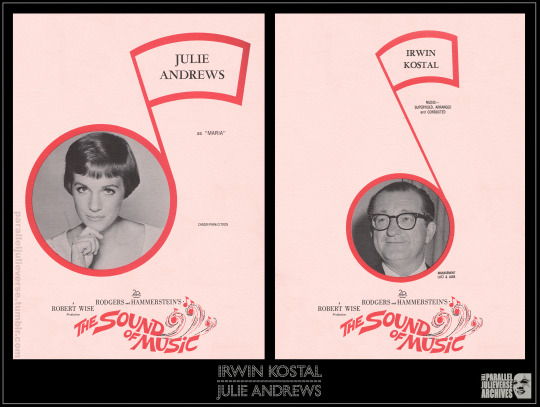
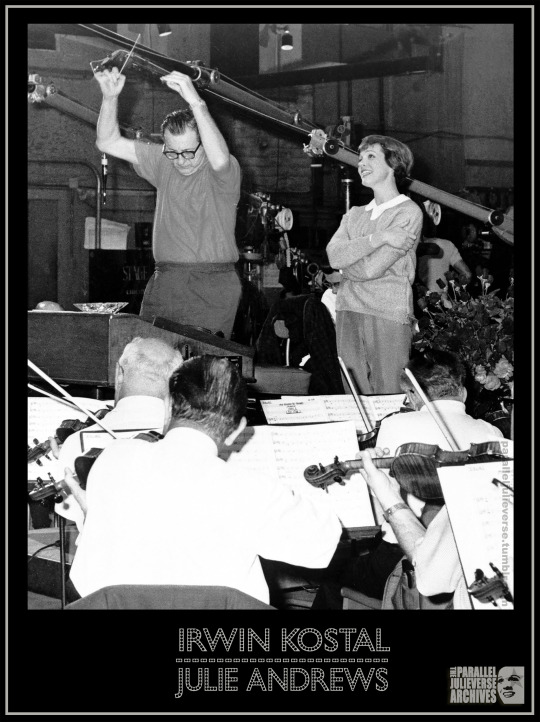
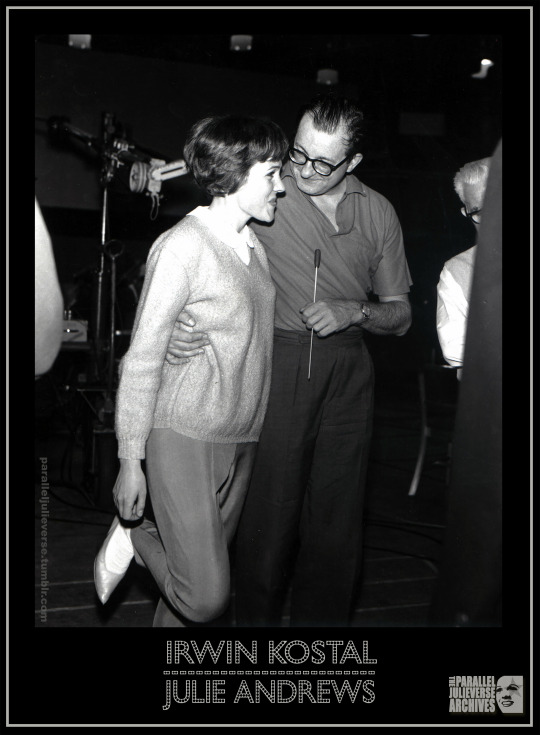
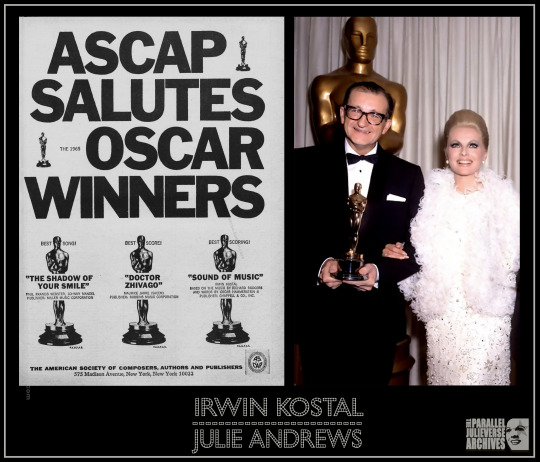
‘Gentlemen like you are few...’: A Supercentenary Tribute to Irwin Kostal
1 October 2021 marks the 110th anniversary of the birth of Irwin Kostal, the musical arranger, orchestrator and conductor whose work helped shape the sound of the post-war American stage and screen musical. In this post we look back at the career of this remarkable 'music man’ with a particular focus on his collaborations with the equally remarkable Julie Andrews -- who, as it happens, shares the same birthday, so this post is doing double birthday honours.
A gentle, unassuming man, Kostal or ‘Irv’ as he was known by associates, was not one for the limelight. It’s possibly why he gravitated to the ‘behind-the-scenes’ art of musical arranging. Unlike composers, performers, or even conductors, arrangers seldom loom large in public perceptions of professional musicianship. They are, for the most part, the ‘invisible artists’ of the music industry: their contributions to the sound and experience of music are immense, but they remain largely ‘uncredited in records, liner notes or books or records’ (Niles 2104, p. 4). That Irwin Kostal would ultimately prove a rare exception to this tradition of thankless anonymity -- becoming sufficiently well-known to have his own name not only included on recordings, but emblazoned on the front cover alongside those of the ‘star’ vocalists with whom he worked -- is a testament to the singularity of his talents.
Born the son of first generation immigrant parents in Chicago in 1911, Kostal claimed he was instantly ‘smitten’ by music when he saw a piano at the age of two-and-a-half, but his family was too poor to afford such luxuries. Moreover, his father -- a hard-drinking Czech with a fiery temper -- was ‘rigidly opposed’ to his interests in music and ‘could see no future in it’ (’Irwin’ 1962, p. 70). So Kostal initially had to content himself with listening and absorbing as much musical knowledge as he could indirectly. When he was eleven, his father finally brought home a broken player piano salvaged from a removals job and it provided the young Kostal with the launch pad he needed.
Kostal devoted himself to his musical education with single-minded zeal. His formal training was intermittent -- enabled by a supportive mother who ‘surreptitiously managed to save money from her weekly allowance for my musical instruction’ (’Irwin’ 1962, p. 70) -- but he was a passionate autodidact who would spend countless hours studying and practising on his own. By age 15, he was already playing professionally with local touring bands, while also offering his own services as a piano teacher with, at one point, more than 40 pupils (ibid.).
When he wasn’t playing, Kostal would be found in the local library poring over musical scores and reading about the greats of the classical canon. He was particularly intrigued by orchestration and the possibilities it offered for varying the sound and feel of music. He recalls how he would take orchestral scores home and study all the parts learning ‘about musical instruments I never knew existed’ (Suskin 2009, p. 56). He progressively worked his way through the music of the masters, going alphabetically:
‘Bach...Beethoven, Brahms, Debussy, Elgar, Frank, Gounod, on and on through the alphabet...I tried to absorb everything. By the time I came to Ravel, Tchaikovsky and Wagner, I knew quite a lot about music in a jumbled way’ (Suskin 2009, p. 57).
While still in his teens, Kostal started to experiment with arrangements of his own, scoring a high school production of Uncle Tom’s Cabin with multiple variations on the American folk melody ‘Way Down upon the Swanee River’. ‘By taking away the rhythmic aspects and playing it in a minor key,’ he recounts, ‘I found lots of ways to play this song, making it fit the dramatics of the half-hour long story’ (ibid., p. 56). Thus, Irwin Kostal the arranger was born.
Throughout the 1930s and early-40s, Kostal honed his talents in a professional capacity, working with various big bands, before finally landing a job as a resident arranger for an NBC radio affiliate in Chicago. Following the war, Kostal moved to New York where, after a rocky start, he secured regular work as conductor and arranger on a number of long-running radio and TV variety shows including Your Show of Shows (1950-54), Max Liebman Presents (1954-56), and The Garry Moore Show (1959-63). It was demanding, fast-paced work with Kostal having to arrange and orchestrate hundreds of score pages a week, but it consolidated his musical versatility and capacity to work across a wide range of styles and forms (Suskin 2009, pp. 57-60).
Throughout this period, Kostal was also orchestrating for Broadway shows, racking up over 52 credits on theatre productions big and small (Allen 1995, p. 18). Many of these assignments were done in a ‘ghost-writer’ capacity including contributing work to such classic musicals as Wonderful Town (1953), The Pajama Game (1953) and Silk Stockings (1955). A major breakthrough came when Kostal was contracted to work in a credited capacity as co-orchestrator on the original Broadway production of West Side Story (1958) -- collaborating with Leonard Bernstein, Stephen Sondheim and Sid Ramin. It earned him his first Grammy Award and a subsequent invitation to arrange and orchestrate a string of other big Broadway musicals including Fiorello! (1959), Sail Away (1961) and A Funny Thing Happened on the Way to the Forum (1962).
The success of West Side Story also saw Kostal do repeat honours on the film version (1961) which would, in turn, earn him an Academy Award and kickstart a hugely successful Hollywood career. In 1963, Kostal was invited by none other than Walt Disney to take on the major job of arranging the songs for Mary Poppins (1964) which had been written by the in-house Disney composing team of Richard M. and Robert B. Sherman. The Sherman Brothers claim to have suggested Kostal because they were fans of his Broadway work and they wanted a bright theatrical sound for the score. However, Walt Disney demurred. He reasoned it was a period film and they needed someone who could write music for any style or era, suggesting they get the musical director from The Garry Moore Show instead. Cue mutual delight when it was discovered they were all referring to the same man, Irwin Kostal (Sherman & Sherman 1998; Suskin 2009, p. 65).
Kostal’s work on Mary Poppins catapulted him to new heights of mainstream success. It not only secured him another Academy Award nomination -- he lost to Andre Previn for his work on My Fair Lady -- but it also brought him a tidy fortune in royalties from the film’s best-selling soundtrack album (’Kostal’s’ $65,000′, 57). His fame -- and fortune -- skyrocketed even further the following year when Kostal was contracted to arrange the score for The Sound of Music (1965). His dazzling efforts on this box-office blockbuster confirmed Kostal’s status as Hollywood’s presiding musical wonder-boy and saw him walk home with his second Oscar. A string of other big screen musicals followed including Half a Sixpence (1967), Chitty Chitty Bang Bang (1968) and Bedknobs and Broomsticks (1971).
Many of these films were repeat collaborations because Kostal favoured working with people he knew and with whom he clicked personally and creatively. He would for example continue as the de facto ‘house’ arranger for Disney well into the 1980s, working on various assignments for the studio including Pete’s Dragon (1978), Mickey’s Christmas Carol (1983) and the controversial re-recorded 1982 release of Fantasia (1940/1982) (Tietyan 1990). Kostal would also maintain a long association with the Sherman Brothers, acting as musical arranger for all their big screen musicals including the aforementioned Chitty Chitty Bang Bang (1968) and Bedknobs and Broomsticks (1971), as well as Tom Sawyer (1973); Charlotte’s Web (1973); and The Magic of Lassie (1978) (Sherman & Sherman 1998).
The other great collaboration of Kostal’s career was of course with Julie Andrews. Perhaps it was the fact that the pair shared the same birthday but Kostal had an extraordinarily sympathetic relationship with Julie and he would work with her more than any other vocalist. Long before they teamed on Poppins and The Sound of Music, Julie and ‘Irv’ were making musical magic together. Kostal was the arranger and conductor for Julie’s first two solo albums for RCA: The Lass with the Delicate Air (1957) and Julie Andrews Sings (1958) where his sensitive facility with a wide range of musical idioms from English classical to Broadway and Tin Pan Alley came to the fore. Reviewing the first of these albums at the time of its original release, one music critic lauded it as ‘a record to charm every member of the family...[with] a combination of sincerity and simplicity and wholesome sweetness...Thank goodness arranger and conductor Irwin Kostal met the challenge and set the ballads winningly without overpowering Miss Andrews’ light pure tones’ (RRS 1958, p. 5A). In a similar vein, another reviewer praised the second album for ‘its charming unforced version of standards, well known and almost forgotten...Miss Andrews still sings naturally and purely [and] the deft accompaniments played by an orchestra under Irwin Kostal are agreeably restrained’ (Masters 1959, p. 11).
In this early period Kostal also worked with Julie as guest star on several episodes of The Garry Moore Show, where he was resident musical director. In this context, Kostal was pivotal in helping establish the legendary teaming of Julie and Carol Burnett which came out of the Garry Moore appearances. He would go on to act as musical director for their breakout 1962 TV special Julie and Carol at Carnegie Hall which would earn Kostal his first Emmy (Taraborelli 1988, pp. 172-79). He would secure his second Emmy a few years later working with Julie again on the 1965 variety special, The Julie Andrews Show (1965) where, among other highlights, Kostal scored a series of stellar song-and-dance medleys for Julie and guest star Gene Kelly. The same year, Kostal teamed up with Julie on yet another recording with the 1965 edition of the annual Firestone Christmas albums.
It was however their combined work on the two big musical mega-hits, Mary Poppins and The Sound of Music, that secured the Kostal-Andrews partnership a place in the history books. A cultural phenomenon of the highest order, the soundtrack recordings for these two films remain among the most successful albums of all time. Mary Poppins held the #1 spot on the US national music charts for 14 consecutive weeks in 1964, beating out Elvis Presley and The Beatles (Hollis and Erhbar 2006, pp.72ff). The album for The Sound of Music sold over 9 million copies in its first four years of release alone, remaining in the Billboard Top 100 for an unbelievable five-and-a-half years, and becoming the highest selling LP of all-time in the US up to that date (Murrells, 1978) The Sound of Music continued its record-breaking run abroad, dominating the international charts and holding the #1 spot for 75 weeks in Australia, 73 weeks in Norway and 70 weeks in the UK, becoming in the process the single biggest selling album worldwide of the 1960s (Harker, 1992, pp. 189-91).
Commentators have frequently singled out the combination of Julie Andrews’ soaring vocals and Kostal’s dynamic arrangements as instrumental to the phenomenal success of these two albums. ‘Miss Andrews glows--positively glows--right through the record groove, vinyl disc, amplifiers, speakers, and all other mechanical barriers,’ enthused one contemporary reviewer of the Mary Poppins soundtrack, noting how the ‘songs that Richard M. and Robert B. Sherman have written’ and ‘the handsome arrangements by Irwin Kostal have the perfect balance ‘of lilt and flair to provide Miss Andrews with an effective working basis’ (Wilson 1965, p. 109). Apropos The Sound of Music, another critic pronounced it ‘as good a reproduction of a score as has ever been made’, noting how it ‘presents Julie in a most appealing role and given the splendid musical direction of Irwin Kostal, her talent comes shining through...as a treat beyond measure’ (Moore 1965, p. B6).
In total, Julie Andrews and Irwin Kostal would work together on six recordings, two musical motion pictures, two television specials, and a host of other TV appearances representing some of the very best of Julie’s musical work during her heyday of the 1960s. Considered alongside the wealth of Kostal’s other work across film, stage, television and recording, it’s hard not to concur with Disney’s Nelson Meecham who, on the occasion of Kostal’s passing in 1994, eulogised: ‘He brought the joy of music to more people than it is possible to count’ (Allen, p. 19).
Sources:
Allen, John F 1995. ‘Remembering a Music Man: On the life and work of Irwin Kostal.’ Boxoffice. August: pp. 18-19.
Harker, Dave 1992. ‘Still Crazy After All These Years: What was popular music in the 1960s?” Cultural Revolution? The challenge of the arts in the 1960s. Bart Moore-Gilbert and John Seed, eds. Routledge, London and New York: pp. 186-200.
Hollis, Tim and Erhbar, Greg 2006. Mouse Tracks: The Story of Walt Disney Records. Jackson: University Press of Mississippi.
‘Irwin Kostal: Music in all its many forms is his life.’ (1962). The Province. 2 June: p. 70.
’Kostal’s’ $65,000 Poppins Score’ 1965. Variety. 10 March: p. 57
Levy, Charles 1964. Mary Poppins: About the stars and photo-story features [Press kit]. Buena Vista Distribution, New York.
Masters, John 1959. ‘Off the Record: Enchanting Music.’ The Age. 7 January: p. 11.
Moore, Robert 1965. ‘Record Turntable: Julie Andrews out in front again in film album of”Sound of Music”.’ The Arizona Daily Star. 7 March: p. B6.
Murrells, Joseph, ed. 1978. Book of Golden Discs: Records that sold a million. Barrie & Jenkins, New York.
Niles, Richard 2014. The Invisible Artist: Arrangers in popular music (1950-2000). BMI, London.
Oliver, Myrna. 1994. ‘Obituaries: Irwin Kostal; Film, TV Orchestrator.’ The Los Angeles Times. 1 December: P. B8.
RRS 1958. ‘On the Record: ‘Lass with the Delicate Air.’ Bristol Herald Courier. 9 February: p. 5A.
Sherman, Robert B & Sherman, Richard M 1998. Walt's Time: From before to beyond. Camphor Tree, Santa Clarita, CA.
Suskin, Steven 2009. The Sound of Broadway Music: A book of orchestrators and orchestrations, Oxford University Press, New York.
Taraborelli, J. Randy 1988. Laughing Till It Hurts: The complete life and career of Carol Burnett. William Morrow & Co, New York.
Tietyan, David 1990. The Musical World of Walt Disney. H. Leonard, Milwaukee, Wis.
Wilson, John S. 1965. ‘The Lighter Side’. High Fidelity Magazine. 15: 4: pp. 107-111.
© 2021, Brett Farmer. All Rights Reserved.
#julie andrews#irwin kostal#musicals#classic film#the sound of music#mary poppins#Disney#Sherman Brothers
20 notes
·
View notes